
Weekdays at 11:05 am


Weekdays from 12 - 3 pm
Weekdays at 3:05 pm




Weekdays at 11:05 am


Weekdays from 12 - 3 pm
Weekdays at 3:05 pm



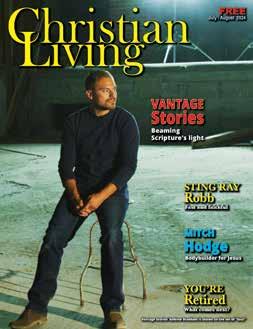
PUBLISHER
Sandy Jones • 208-703-7860 christianlivingmag@gmail.com
EDITOR
Gaye Bunderson
editorgaye@gmail.com
Submit story ideas, article submissions & press releases
GENERAL INFO christianlivingmag@gmail.com 208-703-7860
ADVERTISING & SALES
Kimberly McMullen • 208-703-7509 kim.bcliving@gmail.com
GRAPHIC DESIGN
Denice King • 208-918-5190 www.greentreedkdesign.com
Ronn Seidenglanz, Sidewayz Films
CONTRIBUTORS
Larry Banta, Steve Bertel, Daniel Bobinski, Rick Chromey, Tom Claycomb III, Doug Hanson, Roxanne Drury, Joan Endicott, Greg Grotewold, Leo Hellyer, Vincent Kituku, Dennis Lopez, Rosie Main, Gary Moore, Bethany Riehl, Bradley Shotts, and Janet Thompson
Idaho


By Sandy Jones
Before you start throwing the extra tomatoes from your garden, I’ll admit I’m a sinner, saved by God’s Grace, because He extended Mercy to me.
I never try to do a Publisher’s Corner on my own; I always pray over it, sometimes for weeks, or even the couple of months between deadlines.
As I started preparing for this issue’s edition of ‘what’s on Sandy’s mind’ I opened a word doc that’s been sitting on my computer’s desktop for some time. It was a note I started as a reminder to myself last year as I was working with a ministry coach. The note says, “God. what do You want me to say yes to??”
“God what do You want me to say yes to??” seemed like a great starting point, but what DID He want me to say yes to? I believe it’s this: a reminder to myself that as Christians we are to love one another. It’s not a suggestion – it’s actually a commandment found in John 13.

“A new command I give you: Love one another. As I have loved you, so you must love one another. By this everyone will know that you are my disciples, if you love one another.” – John 13:34-35 NIV
As I’m sitting here with my head spinning from all of the social media hate and discontent going through it, I’m literally seeing scenes play out in my mind of Christ and the woman caught in adultery.
Did He beat her over the head with her sin?
Did He belittle her?
Did He shame her?
No. He simply said, “Go and sin no more,” as found in John 8:11 NIV. Yes, it was an order, but it was delivered with love, and I believe, with compassion.
Recently a song on the radio has caught my attention. It’s got a fun, bubbly melody, which always catches my ear, so I paused to listen. It’s a song Jason Gray released last year called “Jesus Loves You (And I’m Trying)” where he starts by talking about typing a heated response to a social media comment, then deleting it without ever posting it.

Oh boy did it speak to my heart – how many times have I done this myself? Worse yet, how many times have I not practiced the art of pushing the delete button and been less than loving?
As we travel through the coming weeks and months, navigating celebrations of things we don’t see eye to eye on; or enduring the coming political debates, and eventually the election itself, it’s my hope that I continue in my endeavor to bring glory and honor to God, our Heavenly Father, each and every day. To keep in mind that the Judgment Seat is only big enough for one butt, His, and that there’s no room for mine to join Him up there.
He’s called me, commanded me really, to love my neighbor, to correct gently when necessary, and most importantly to remember to remind them how much He loves them, and that He proved it by making the ultimate sacrifice for them!
Some of you have reached out asking about my husband and his battle with lung cancer. Here’s a quick update. In January Steve suffered a saddle pulmonary embolism that shut the air off to both of his lungs for enough time to cause some cognitive damage. We’re praying that this fairly new complication is not permanent. We know we serve a Mighty God, Who has already stepped in and stopped the progression of Steve’s cancer. We thank everyone who has been coming alongside of us, joining us in prayer, and we continue to covet those prayers. Thank you, too, to the many who have helped, and those who have offered, but haven’t been called on yet – just wait, your turn is coming! We know everything will be God’s Perfect Will, in God’s Perfect Time.
AND while I’m saying thank you, I just want to take a moment to thank all of our readers who consistently shop our advertisers. When you do support our advertisers please be sure to thank them for the part they play in this ministry – we simply could not do what we do if it weren’t for their support!
Have a wonderful summer!
Until next time…
God Bless! n




Longtime readers of Christian Living Magazine may recall that in the September/October 2021 edition, editor and writer Gaye Bunderson featured a story titled, “Doug Armstrong – His Road from Television GM to The Statehouse,” which covered how former KTVB GM Doug Armstrong had turned his love of God into his new calling: serving as the chaplain of the Idaho State Senate at the Statehouse in Boise.
He finished his fourth year in this role during the 2024 legisla tive session, and each year he has meticulously recorded each daily prayer where he has lifted Idaho’s senators, the state, and the business at hand up to the Lord. He has sub sequently published the prayers wordfor-word in annual books.
Each year’s prayers have their own theme. For example, for the recently completed 2024 session, Armstrong focused his daily prayers on the book of Prov erbs, with this year’s book titled, “2024 Idaho Senate Prayers – The Wisdom of Proverbs” by Chaplain Douglas L. Armstrong.
“Although CLM doesn’t do book re views, we have found it encouraging to know that prayer to the one true God is welcome in our Statehouse at the begin ning of each day the senate is in session,” Sandy Jones, CLM publisher, said.

She continued, “Doug’s prayers are eloquently thoughtful and encouraging, while also being thought-provoking. Any or all of these books would be a great addition to anyone’s library who may be looking to enrich their prayer life, and all are available on Amazon.” “The books are priced as low as Amazon allows for a book this





By Daniel Bobinski
Editor’s note: The author of this column deviated from his usual emphasis for this issue in order to write about a friend who passed away recently – a friend who was a committed and respected member of the Christian community.
The Word of God says that faith without works is dead. If that’s the case, Tom Lopac was very much alive. That is, until the first week of June, when God took him home. One of Tom’s closest friends was Matt Stanley. “What struck me most about Tom was his profound generosity,” says Stanley. “Tom would give you the shirt off his back even it was 20 degrees outside. If Tom saw a need, he would reach out to meet it.”

Regular readers of my column know that for the past 18 months I’ve been devoting this space to exploring parables and symbolism in Scripture. This installment is different because people who didn’t know Tom need to know about Tom.
I know the world has no shortage of strong, solid believers going home to be with the Lord, but when my friend, Tom Lopac, passed recently – and extremely suddenly – I decided I could not let it go without acknowledging the impact Tom made on so many people’s lives.
Matt Stanley rapidly agrees about the impact Tom made. “Words are great,” he says, “but love leads with action, and Tom was an action man. People respond when you love people with your actions – when you’re meeting people’s needs in a practical way. Tom did that. He lived life with people. He loved them the way Christ did. And it gave him a platform for sharing Christ because he modeled it, first.
“Tom would buy people a meal if they needed it. He would stop and listen to people’s problems. He would cry with them. If they needed work, he would hire them to work for his company. He would let people stay at his house until they got their feet under them. He sincerely cared about people.
“Tom Lopac was the most like Jesus out of everyone I’ve ever known.”
As someone who met Tom while attending a small fellowship, I will back up everything Matt Stanley is saying. Tom was always helping people. For example, Tom recently learned a friend’s daughter needed money to go on a mission trip. What did Tom do? He held a garage sale, raised over $1,400, and gave all the money to his friend’s daughter.
ate in Minnesota; but several years later he moved back to Boise, where his wife was raised. Then, after several years of working as a window washer, Tom started his own business, opening Picture Perfect Window Cleaning in 2007.
Yet Tom’s passion for sharing the gospel never wavered. He regularly hosted Bible studies in his home and the first Thursday of each month Tom was down at the Boise Rescue Mission, sharing the gospel and praying with people.
Matt Stanley was in his early 20s when God worked in his life to soften his heart toward people in need. But then he met Tom. “It was transformational,” Stanley says. “Tom was like, ‘We are going, and we expect God to move. We’re available.’” And God did move. “When Tom taught at the Rescue Mission, there were words of knowledge given and people got healed.
“I remember the first time Tom asked me to cover for him. Multiple guys were asking, ‘Where is that Tom guy? When is he coming back to the chapel?’”
Stanley says it was amazing. “When Tom was there, he exercised authority. It was like night and day from other times I had been there. Tom brought a tangible difference. He had the fire of the Holy Spirit. There was LIFE!”
What was different? “It was Tom,” Stanley says. “He brought a vibrancy. It was Tom’s faith. And that carried over into everything Tom did.”
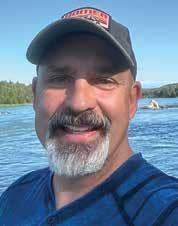
With Tom’s sudden passing at age 60 due to a heart attack, his Facebook page is filling with stories of how he touched people’s lives. Stories about mission trips. Stories about canning fruit in his backyard, or hosting cookouts. Stories of hosting worship events. Stories of how he touched people’s lives as a children’s minister. Stories about the puppet shows that he and his wife gave (Tom’s wife, Marie, passed several years ago after a long bout with cancer). Stories about how Tom helped people in their times of need.
When he learned that people needed help around their house, he would often loan them the tools they needed or even come over and devote his own time to helping them.
When Tom learned someone had an illness, he was eager to pray for that person – and often saw people get healed on the spot. He also had a knack for finding new believers who needed discipling and helping them develop accountability for getting into the Word of God.
Originally from the Milwaukee area, Tom Lopac came to the Treasure Valley as a children’s minister for an Assemblies of God church. He did that for six years in the 1990s, then took a pastor-
One comment, from Aundrea Friedley, said, “Tom and Marie were two people that poured into so many people. I think most of us have no idea.” I agree. Tom Lopac was a man who poured himself out for Jesus, and Jesus kept refilling him so that he could keep pouring. I will miss my friend. And I pray that with his passing, Tom’s example will serve as motivation for everyone – me included – to give more of ourselves for the cause of Christ.
As Matt Stanley says, “People will do nice things for people once in a while. Tom did them all the time. What really stuck out was his consistency. Every opportunity Tom could find to serve people, he would do it. He was always encouraging people. He did it all the time.”
On Earth, Tom Lopac lived from 1963 to 2024. But he left the fingerprints of God in many places – and those fingerprints will last forever. n
Daniel Bobinski, Th.D., is an award-winning and best-selling author and a popular speaker at conferences and retreats. Reach him at danielbobinski@protonmail.com or (208) 375-7606.
A film festival aimed at crafting films of significance to benefit charitable and ministry organizations will be sponsored by the Tennessee Christian Chamber of Commerce, Prelude Pictures, Brentwood Baptist Church, and Palette Productions on Aug. 2-3 at Brentwood Baptist Church in Brentwood, Tenn. Judging will be by industry leaders with Affirm/Sony, casting directors, major actors, and directors.
Also at this event, respected entertainment industry professionals with decades of experience, known for their involvement in Hollywood blockbusters, will share their insights in master classes on Saturday, Aug. 3. These experts have contributed to projects such as “Space Cowboys,” “God’s Not Dead: A Light in the Darkness,” “Dirty Harry,” “Miracles from Heaven,” and “War Room,” among many others, according to a press release.
“Rather than embarking on the creation of a short film based solely on a spur-of-the-moment creative idea, production teams will set their sights on partnering with a biblically rooted ministry or charitable organization that could greatly benefit from a captivating narrative short film,” Michael C. Carnes, producer/director and a board member of the Tennessee Christian Chamber of Commerce, said.

Carnes stated, “Harnessing the skills and resources entrusted to you by God, you commit to aiding this cause by dedicating your time and equipment to craft a compelling short film specifically tailored to amplify the mission and impact of the selected ministry you partner with. This endeavor seeks to tell a dramatic story, delving deeper than mere news coverage or commercial promotion.”
Registration is now open at www.christiancharityfilmfestival.com, and submissions for shorts are due no later than July 19. For more information, contact Carnes at 615-498-8518 or mcarnesproducer@gmail.com. n











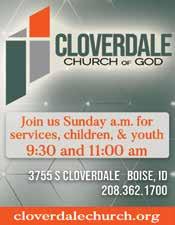



By Janet Thompson
“My mom always has her bag of nuts with her!” My daughter, Kim, made the above comment when my daughter-in-law asked what she should prepare for hubby and me when we were coming to visit since she knew we try to eat healthy, raw, and organic. Kim was saying: Don’t worry about it. If my mom can’t find enough to eat, she’ll snack on her nut concoction.
I’ve always enjoyed a variety of nuts since I was a kid. I remember sitting with my mom shelling walnuts for hours from big grocery bags we would fill up from the walnut orchards that used to be so prevalent in Southern California. After the harvest, they let the public come through and glean walnuts. Great memories and great walnuts! My heart breaks as I watch so many of these walnut orchards destroyed to build new houses. I want to scream, “Don’t you know how good those walnuts are for you and how long it took for those trees to grow?” But I don’t think anyone would listen to me.
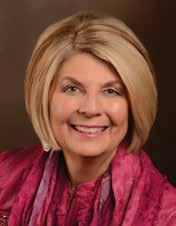
We always had walnuts in the house. We baked with walnuts and loved just snacking on them. I can remember eating as many as I shelled!
Then as I grew older and was always watching my weight, I started hearing how high in calories nuts were and I treated them like a delicacy…only adding to banana nut bread or an occasional crumb topping or Waldorf salad (apples and walnuts). But with time, there was a trend to put nuts in salads and I was all over that. How had we missed all those years tasting how delicious walnuts or pecans are in a salad with strawberries or pears or any array of fruit? Oh and that was something new too. Salads didn’t just need to be veggies and tomatoes – fresh fruits of all kinds are fabulous in a green salad topped with nuts and raspberry salad dressing. A real treat.
So over the years, I enjoyed nuts sparingly and guiltily. All that changed when I was diagnosed with breast cancer and began researching the best foods for fighting cancer. At the top of the list were nuts! Not just any kind of nuts though: organic and raw were the best because the high temperatures used in roasting nuts can destroy many of the good nutrients and the pesticides sprayed on nonorganic nuts negated much of their nutritional value. Nuts are little gifts from God, packed with powerful nutrients for not only fighting cancer, but also heart disease, high cholesterol, endocrine and inflammatory problems…the list is endless. Yes, they have calories, but they are such a concentrated source of nutrition, that you don’t have to eat many to gain the benefits. Nuts are good calories. Calories you want to include in your diet while you eliminate wasted calories.

• Pregnancy Testing
• Information
• Referrals
• Material Aid

I make my own “trail mix” with a variety of organic, raw, unsalted nuts, and if possible, sprouted. I always start with cashews, walnuts, and pecans, and then I might add pistachios, shelled sunflower seeds, pumpkin seeds, macadamias, Brazil nuts, or hazelnuts. Sometimes I add dried unsulphured fruit, but usually, it’s just a mixture of nuts, which I take with me everywhere and keep on my desk in my office while I’m writing.
Remember that raw nuts are unprocessed so keep any extras in the refrigerator or freezer. I like to buy raw, organic nuts in bulk and freeze them. Then I’ll make a big batch of my “trail mix” combining a variety of nuts and portion into smaller bags that I keep in the refrigerator and take out one bag at a time to enjoy.
Yes, if you walked into my office today, you would see my bag of nuts...in fact I just had a handful while I was writing this article. If you looked in my travel bag, yep there would be a bag of nuts. When hubby and I go to town for the day, you guessed it, I have my bag of nuts if I want a snack while we’re shopping or watching kids’ soccer games or hanging out with the family.
It doesn’t take many of these powerhouse gifts from God, so a handful or two will do you nicely and probably quench your appetite so you don’t eat so much at the next meal. Think how much better this is for you than a bag of chips or a candy bar or even popcorn. Popcorn doesn’t have the nutrients of nuts, but you can add nuts to your popcorn and that’s yummy too.
I’ve researched a couple of websites I think you will enjoy. The first one, Why You Should Go Nuts for Nuts (https://www.everydayhealth.com/diet-and-nutrition/0406/why-you-should-go-nutsfor-nuts) is one I really like. You’ll see pictures of various nuts with a summary of health benefits and a nutritional breakdown of each featured nut.
Here’s a great article about walnuts: 10 Surprising Facts About Walnuts (10 Facts About Walnuts – Facts.net).
If you find nuts hard to chew, try grinding or chopping them and adding to your recipes.
Add nuts to your salads, cereal, oatmeal, yogurt, granola, cereal, vegetables...the possibilities are limitless.
If you can’t go raw nuts, Dr. Oz says in his book, You: On a Diet, that it’s okay to cook them at 275 degrees for 9-12 minutes to roast without damaging the good oils and nutrients.
If raw organic is too expensive, I would opt for at least raw because roasting damages most of the nutrients. You might wash them off and then do a light roasting.
If you have found this or another ar ticle valuable, please consider helping us bring stories like this to our community by suppor ting Christian Living Magazine, a 501(c)3 ministr y, at
T his summer, you can host a FREE, exciting, fun-filled 90 minute 5-Day club for kids in K-6th gr ades. You provide the kids, snacks, and venue, we provide the rest!

Child Ev angelism Fellowship® -Tr easur e Valley www.tv cef.com Games! Prizes! Songs! Bible lessons! Snacks and more!

If you don’t like a particular nut, no problem. There are so many others to choose from.
Some people like to make their own almond milk (well nessmama.com/reci pes/homemade-almondmilk). Yummy!

Here’s an easy, healthy nut recipe you can modify to include whatever nuts you prefer or have on hand. n
Janet Thompson, award-winning Christian speaker, freelance author, and author of 20 books, is also the founder, director, and God’s servant of Woman to Woman Mentoring Ministry and About His Work Ministries. Her passion and focus is mentoring the next generation. Her tag line is, “Sharing Life Experiences and God’s Faithfulness.” She has a BS in Food Administration, MBA, and Master of Arts in Christian Leadership. Check out her books and sign up for her free weekly online blog and monthly newsletter at womantowomanmentoring.com. Join her on www.facebook. com/Janetthompson.authorspeaker, LinkedIn, Pinterest, X, and Instagram.
1 cup macadamia nuts
1 cup pecan or walnut halves
½ cup pepitas (pumpkin seeds)
½ cup pistachios
1 cup dark chocolate chips (or substitute sugar-free chocolate chips)
1½ Tbsp. coconut oil
Flaky sea salt for sprinkling
Line a cookie sheet with parchment paper. Mix nuts in a bowl. Melt the chocolate chips and coconut oil together in the microwave on reheat or low just until melted. Stir periodically, being careful not to overcook or burn. Pour the melted mixture over the nuts and stir to combine. Portion about 2 Tablespoons each into mounds on the cookie sheet, pressing the mixture together with your fingers. Makes 15 or more if you portion them smaller. Place the cookie sheet in the freezer for an hour. Store clusters in the freezer or refrigerator. Let come to room temperature before eating. These are delicious!

By Leo Hellyer
Our nation is at a critical juncture on a number of fronts: politics, economics, internal security, military readiness, faith, and health to name a few. There is another area that has an extreme effect on the leadership in the family, as well as leadership in our society. We are talking about the absence of strong, moral, dynamic male role models for young men to emulate as they venture into adulthood.
For quite some time, our nation has been experiencing an epidemic, which has for a large part been ignored. This is the epidemic of fatherhood abandonment. I came across a book that addresses this epidemic very skillfully. This book, “Man Enough to Forgive” by John J. Smithbaker, delves into this critical area seeking to provide tools to eradicate this epidemic.
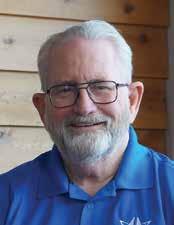
The author states in the prelude of the book, “‘Man Enough to Forgive’ needed to be written to specifically address the No. 1 societal issue of our time – the fatherlessness caused by divorce or the abandonment, absenteeism, neglect, or indifference of a boy’s God-ordained pastor, provider and protector – his father.”
This is warfare, spiritual warfare, which needs warriors to go into battle. In Psalm 11:3 we read, “When the foundations are being destroyed, what can the righteous do?” The answer is that we can go to battle. We can shore up the foundations of our society. The family is the foundation of any society. The father has been ordained by God as the leader of the family. To have strong families we must have strong, moral, present fathers.
It is important to realize there are many reasons why some fathers are not present in the lives of their children. The father may have died, divorced, been incarcerated, is drunk or drugged out, deployed in the military, or many other situations. Whatever the circumstance, life without a father can be lonely, depressing, challenging, and confusing. We all need the input, love, support, and guidance that a present and involved father provides.
None of us can change what has happened to us; we have no control over that. We do not have to be victims of our upbringing, however. We can be in control of what our lives will be like from today forward. A key factor in our ability to move on in life is whether we can put the loss, hurt, pain, regrets, and victimization behind us. Are we going to control it, or is it going to control us?
To be able to be successful in moving on in our lives we must be ‘Man Enough to Forgive’. We must be able to forgive the men in our lives who simply did not provide us with the foundations in life that we needed. We also must be able to forgive ourselves for not overcoming our lack of a present, mentoring father. Are we going to live our lives out as victims, or as survivors, victors, leaders and mentors? Not only can we change the trajectory of our lives, but we can speak into the lives of other men and boys that God brings along our paths.

As men, quite often we tend to attempt to stuff things away that are difficult in our lives. We have the false belief that they will eventually go away if we ignore them. For us to move on in life, we must learn how to deal with the emotional hurt we have experienced. The first step in overcoming these hurts successfully is to realize that we cannot accomplish this in our own strength. We must become the men that God created us to be, regardless of our life situations. We must seek and accept the unconditional love from our Heavenly Father that we may not have received from our earthly father for whatever reason. We must approach all our challenges in life with God’s power, courage, and perseverance. Whether we were blessed with an earthly father who was present, loving, and God-honoring or not should not determine how successfully we face the obstacle course of our life experiences. In the end, it is up to each of us to determine how we will finish the challenges of life.
In addition to writing this book, Smithbaker founded a ministry organization called Fathers in the Field to put feet to the truths presented in the book.
Men, each one of us has a responsibility to be involved in the lives of other men. We need to help men heal the father wounds that are present in their lives. We can speak into the lives of other men oneon-one, in small groups, as a part of a church’s men’s ministry, and for sure as a prayer warrior for other men. If you are suffering from some type of father abandonment, own that, and reach out to men who are currently in your life. Seek wise counsel, guidance, support, accountability, and compassion from the men that God has placed in your circle.
Above all, remember that you have a loving Heavenly Father who is ever-present in your life. Reach out to Him. Let Him speak into your life. Respond to His direction, challenge, and divine appointments. Be available to your Heavenly Father to help heal wounds in other men’s lives. We can be a catalyst in bringing men into the lives of their sons and daughters. We can be instrumental in shoring up the foundation of our society: the family. Men of God, rise up, be heard, be seen, and be present. n
Leo Hellyer is a non-staff pastor with a local church and has been married to his wife Norma for 50 years. The couple volunteered with the Boise FamilyLife Ministry Team for 20 years. Leo has also been serving with Boise Rescue Mission Ministries for more than 20 years and is currently serving at the River of Life Rescue Mission. He is president and chief firearms instructor with Helping Hands Firearms Training LLC. If you have questions about Real Man’s Toolbox, or need other assistance, he may be reached at silverplate426@msn.com or (208) 340-5544.















By Joan Endicott
“I could never have imagined this level of freedom and independence two years ago, Joan! I am so grateful, happy and at peace with my life right now.” My heart swelled while my eyes welled with tears listening to my client share his emotional summary of his biggest wins and blessings from our coaching over the two years prior (6+ years now).
When I first started coaching him in 2018, although very “successful,” he felt trapped and tethered; traveling three out of four weeks per month to at least five countries, connecting to thousands of people in his organization—too many of whom had his cell number so he felt like he was on-call 24/7. He was highly stressed mentally and emotionally, he didn’t sleep or rest near enough, he was overworked and overwhelmed.
He so desperately wanted to change his life that he would immediately put into practice the tools and ideas that I’d share with him. Guess where I learned most of those valuable tools? Yep, HKU! Hard Knocks University. Quite sure I graduated with honors—possibly magna cum laude.
You see, he was struggling with some of the exact challenges I had experienced years prior in letting go of 1) what others think of me, and 2) what I hoped to control for those I care about. Here’s the deal: We may not call it control, because that doesn’t sound good. In fact, it sounds downright, well…controlling. LOL!
Personal freedom and independence lie in letting go of both! Freedom: the ability to act freely
A state in which a person is able to act and live as he or she chooses, without being subject to any undue restraints or restrictions.
Independence: Freedom from control
Freedom from dependence on or control by another person, organization, or state.
Remember me sharing that I’m a recovering approval addict? I confessed to having wasted too much time worried about what other people thought, being more concerned about another broken human’s opinion rather than being completely connected to my Creator’s. In addition to letting go of what other people think of you, if you want to experience personal freedom and independence, I’ve learned through HKU that you also need to let go of your expectations and desires for others—no matter how just, noble and hope-filled they are. Though we may be 100% motivated by love, nobody wants to feel that another is trying to control them—including you and me.
But why is letting go so darned hard? Because no matter who it is, when we love someone so deeply and desperately, we want God’s best for them—and if it seems to us that they are experiencing or accepting anything less than that, it can be extremely difficult to let go.
In the midst of some of my most agonizing letting go times in life, God gave me the gift of a perfectly timed and poignant dream that has served me and many others since. I dreamt I was running alongside a rushing river, shouting to my precious loved one, “I’m throwing the rope out. Grab the life preserver so I can help you!”
My legs and arms were cut and bleeding from flailing through the brush and branches. Any other day I would have stopped long ago from the exhaustion but my loved one was in danger and needed me, so I pushed myself to keep going and running and yelling: “Hurry! Grab the rope so I can rescue you! You’re in danger!”
Finally, they grabbed it! I was so relieved and kept running to keep them in sight. But wait, what were they doing? They
grabbed the ring and then…looks like they’re throwing it back to me?!
“No, no—you don’t understand. There’s danger ahead. Real danger. I’m here to help you. Please! Please grab it and hold on while I help pull you to safety.” I threw it again. They grabbed it! Great…but then, they did the same exact thing! Now painfully pleading, “What are you doing? Please grab it and let me help you. There’s a waterfall ahead; I want to save you—I love you! I’m throwing it again…please…”
As they were disappearing down the rushing river, I heard, “I don’t want you to save me. I don’t want to be rescued.”
It’s a heartbreaking truth that you cannot rescue someone who doesn’t want to be rescued. If you keep trying, that not only does not help them, but it can also compromise your relationship along with your health, wellness, and life purpose. I know this all too well!
Rewind a few years.
I’d been feeling extremely rundown, exhausted and lethargic for long enough that I knew I needed to go to a doctor. The week prior, I had gone in for the blood work and tests he recommended so today was the day we’d find out the results. I was anxious to get answers for obvious personal reasons but also, on a professional level, it takes a lot of energy to do what I do. Frankly, it’s not good advertising to even appear depressed, distressed, or dragging as a life-coach and “motivational” speaker.
The doctor came in wearing his crisp white lab coat, name embroidered over the heart, stethoscope around his neck, holding a manila patient folder which I knew held my test results. I was so ready to hear some good news!
After the initial greetings, I said, “Bring it on, Doc! What can I do? Can you give me a jam-packed multi-vitamin A-Z shot that will make me walk out of here a refreshed, revived, renewed woman who’s rarin’ to go?” Although laughing while saying it, I was completely serious in hoping that was a viable option.
He began going over the results with me and most of those numbers meant nothing since I had no clue what to compare them to. Able to tell I was not getting the seriousness of my situation, he grew solemn. I can’t tell you anything else he said up to this point—but sitting directly across from me he leaned in even closer, put his hand on my crossed knee and looking me square in the eyes he said, “Joan, I need you to know you can die from this…”
NOW he had my attention! He went on, “I know you truly believe what you write and speak about because, frankly, I’m not sure how you’re even physically functioning at the level you are with these numbers.” He pointed to a specific category on the page and said, “A healthy range for this is in the 70s, but people can get by in the 50s. Your number is 17.”
“Are you stressed?” he asked.
“No, I’m really not…at least I don’t think so,” I responded. His following questions were all directed around any life challenges, hurts, heartaches—a.k.a., things that feel stressful. “The most important thing you need to do, Joan, is to keep your focus on reducing all stress.”
Are you like me—when a doctor says you’re too stressed and you need to lower it, you actually feel a power surge of stress shoot straight through you?
Thankfully, that day opened new doors of understanding and desires to learn more about stress, what it is, what it does, how to actually reduce it.
So the first thing I did was to put my coaching hat on to coach myself. I started with writing a list of those challenges, hurts and heartaches. Another way to ask it is, when you think about it,
what causes worry, fear, unrest, or anxiousness?
After writing that list out, I drew a line down the middle of a second sheet and on the top left wrote THINGS I CAN’T FIX, CHANGE OR CONTROL and on the top right, wrote THINGS I CAN FIX, CHANGE OR CONTROL. I took my first list and put each of those things in the appropriate category on the second page. (A chapter in my first book.)
I was SHOCKED! The things that caused my greatest heartaches (stressors) were the things I had absolutely zero control over. That’s when my journey of finding freedom by declaring my personal independence began.
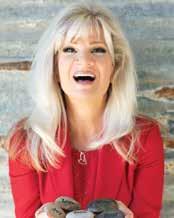
That July 4th I actually wrote out my own Declaration of Independence, which I shared with the loved one I’d been trying to help rescue. I first expressed my unwavering, unconditional love and apologized to them for anything I had done that felt controlling. Next, I shared my painful path in seeking personal freedom along with what God had been teaching me.
Then I shared what I wrote. “Today I’m declaring my independence. I will no longer carry any burden or heartache from decisions you make for your life. I will no longer feel responsible because I, in fact, am not. God’s given each of us a free will. I am responsible to God for mine and you are responsible to God for yours. I make this declaration by faith, not feeling. I know I will be fully and completely reliant on His supernatural power to accomplish this and finally be free.”
So how am I doing with this? Ohh, I really wish I could say that was a one-n’-done declaration, my friend, but when we love others, it is a daily decision, isn’t it?
Is it time for you to create your own Declaration of Independence that will help give you the peace, rest, ease, and personal freedom God desires for you?
Life lessons we get to continually learn:
• Pray without ceasing—stay in His Word
• Get qualified help—God didn’t intend you to do life alone
• You can’t rescue those who don’t want to be rescued. Stop throwing the rope!
• You are 100% responsible to God for you
• They are 100% responsible to God for them
• Control your controllables
• Remember God is sovereign and loves everyone and uses everything Friend, you cannot control what’s happening in the world. Focus on controlling what’s happening in your world. The great news is, the more completely dependent we are on God for what we can and need to control in our own lives, the more we are aware of and able to let go of what we should not try to control in the life of another. n
Grab your FREE copy of Joan Endicott’s “I Get To!”® book at www.JoanEndicott.com. Also, be one of the first to get her second book, “I Get To!”® Own My Worth! Joan is an awardwinning keynote speaker, author and coach whose coaching has reached over 30 countries.



“I love plain old fried fish, but it’s hard to beat a plateful of fish tacos,” outdoor expert Tom Claycomb III said. He also catches the fish that go into the taco recipe. (Courtesy photo)
By Tom Claycomb III
I say it repeatedly but springtime in Idaho is a sportsman’s paradise. We have awesome bear, whistle pig, mushroom, okay turkey hunting and unbelievable crappie fishing, which is what we’re going to cover today. Twenty-five years ago it seemed like crappie fishing petered out about the end of May, but the last 6-8 years I’ve done well up until I knock off for the fall bowhunting season; since I’ve been really killing them the last week, I’m going to do one last crappie fishing article for the year.
If you wonder why I rave so much about crappie fishing, it’s because you’ve never eaten them. Walleye are the best-tasting fresh water fish, with crappie and perch splitting second and third places. They’re a light, flaky fish and are tasty cooked multiple ways, which I will have to cover in a later article but for right now, let’s cover fishing for them.

The experts will tell us that when the water temps hit 45-50 that crappie move out of their winter holes; at 55 they stage outside of their spawning areas, and at 60-65 they move in and start spawning.
I’ve fished for crappie in numerous states. In Nebraska they spawn in the brush piles, in Texas in the willows; but here in Idaho they spawn close to the rocky banks, like 12-24 inches away. Then I do well if I put on a tube jig and clip-on a pencil bobber 18-inches above the jig. I cast it by the bank. You wouldn’t think that would work just setting there, but it does. I don’t know why but I catch twice as many crappie with a pencil bobber as I do with a red/white round bobber.
Colors: Red/white or yellow was the color of choice in the spring. Now? It seems to change every year, so carry multiple colors. Years ago some guy 50 yards down the bank was killing them on black/white tube jigs which I’d never used. So have everyone start off with different colors until you determine what they’re hitting.
You can catch plenty off the bank but a boat definitely helps. I like to be out 20 feet from the bank and cast in or be up within 10 feet and cast parallel to the bank, about two feet off the bank. I’ll slowly lift my rod tip and then slowly drop it while reeling up the slack. They don’t slam it like a bass so if you feel any resistance set the hook. But when I say set the hook, I don’t mean ripping off his lips like you do a largemouth.
To set the hook on a crappie, just semi-gently lift your rod tip and start reeling at a moderate speed. If you get too rough you’ll rip their lips off. They’re called paper mouths for a reason! Normally I recommend using a net or else 60% will rip off, especially the big ones. But with that said, this year they’re swallowing the hook more and I’ve lost very few while boating. Use your own judgment.
After the spawn, which should be over by the time you read this article, they should have moved out to 20 feet of water. When that happens I’ll let my jig to the bottom. Then I fish semi slowly, lifting the tip and then slowly reeling in the slack while dropping the tip.
A lot of times I’ll get hits near the surface. Did they follow my jig up or were they up high feeding? I say they’re up there feeding. Two days ago I was tying on a jig and had a rod hanging off the side of the boat. The jig was maybe 12 inches deep. A crappie hit!
Gear: Spinning rods are the rods of choice. I used to use lightweight crappie rigs but now I use medium weight rods and for two reasons.
1. I don’t want to take 3-4 minutes fighting. I want to reel him in and get back out after another one.
2. During the course of the day you’ll likely catch 1-2 catfish which might take 5-8 minutes to reel in if you’re using a little lightweight crappie rig. That’s wasted time.


I’d recommend 6-lb. test line. As a general rule, the lighter the line the more fish you’ll catch. This holds true on all species. I use 1/8 oz. jigs. Sure, a bigger jig will cast further, but they sink too fast and not naturally. If it is really windy you can clip on a small split shot. This won’t sound like a big deal, but if you’re catching over 200 fish per trip, your fingers will get eaten up by their sharp fins. While unhooking them, they bow up their backs and their fins are out. I’ve found that gloves really protect my hands. This is fresh on my mind since I didn’t wear them two days ago and my fingers are all cut up.
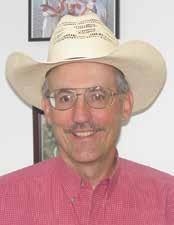
Christian Tip #4: I’d strongly encourage you to memorize Scriptures. Everyone thinks they can’t memorize, but let me ask you a few questions. What’s your name? Phone number? Address? See, you can memorize! Trust me, you can memorize verses, chapters, whole passages like Matthew 5, 6, 7 or whole books. If you need help let me know; I’ll be glad to do a memorizing seminar for you. Fasting/praying/memorizing takes you to a whole other level in your Christian walk. n
For more information about anything in this column, including equipment or gear, contact Tom at tomclaycomb3rd@gmail.com.















By Rosie Main
As the warmth of summer envelops us, it’s a wonderful opportunity to reflect on God’s creation and how we can nurture both body and spirit in alignment with His design. The season offers unique opportunities to boost our longevity and enhance brain health through God-given natural resources and activities. Here are some enjoyable and beneficial activities to engage in this summer that can help you live a longer, healthier life, while honoring the temple God has given you.
1. Stay active with outdoor exercise: Exercise is pivotal for maintaining the temple of our bodies and the clarity of our minds. Taking your workout outdoors during the summer not only allows you to enjoy God’s beautiful creation but also improves cardiovascular health, which is closely linked to cognitive function. Regular physical activity, such as walking in His creation, swimming in natural waters, or cycling through peaceful paths, stimulates the production of brain-derived neurotrophic factors (BDNF), crucial for brain plasticity, essential for learning and memory.

2. Prioritize social engagement: God calls us to fellowship and community. Summer offers plentiful opportunities for gathering with brothers and sisters in Christ. Whether it’s a church picnic, a family reunion, or a community volunteer project, engaging with others strengthens our bonds and reduces stress levels, thereby lowering the risk of dementia. Proverbs 27:17 reminds us, “As iron sharpens iron, so one person sharpens another.” Let us use this season to build each other up in love and faith.
3. Nourish your brain with seasonal foods: God provides an abundance of fresh fruits and vegetables in the summer, which are not only delightful but also packed with antioxidants and nutrients that promote brain health. Foods like berries, tomatoes, and leafy greens are gifts from the Lord that help combat oxidative stress, a contributor to brain aging. Incorporate these bountiful foods into your meals to nourish your body and mind as an act of gratitude for His provisions.
4. Hydrate for health: With the summer heat, hydration becomes even more crucial. The Lord designed our bodies to thrive on water – a vital resource He created. Dehydration can lead to confusion and memory lapses, so ensure you’re drinking plenty of water throughout the day. Enhance your hydration with water-rich foods
like cucumbers and watermelon, and remember, “Whoever believes in me, as Scripture has said, rivers of living water will flow from within them” (John 7:38).
5. Reap the benefits of sunlight: Sunlight, a marvelous creation by God, helps our bodies produce Vitamin D and uplifts our spirits. However, it’s important to enjoy it wisely. To protect your skin and eyes naturally, seek shade during peak sun hours, wear wide-brimmed hats, and use sunglasses that block UV rays. Choose sunscreens with natural, non-toxic ingredients like zinc oxide or titanium dioxide, which reflect God’s stewardship principles by minimizing chemical exposure while effectively protecting your skin.
6. Embrace mindfulness and meditation: Summer can be a great time to deepen your practice of prayer and meditation. Dedicate time each day to meditate on Scripture or engage in silent prayer, which can significantly reduce stress and benefit brain health. These practices align with Philippians 4:8, urging us to think about whatever is true, noble, right, pure, lovely, and admirable – to focus on the good things God has provided.
7. Engage in brain-challenging activities outdoors: Keep your brain and body engaged with outdoor games that reflect the joy of the Lord, such as corn hole or pickle ball. These activities are not only enjoyable but also enhance hand-eye coordination, strategic planning, and social interaction, beneficial for maintaining cognitive health. Organizing a game day with church members or your community can be a delightful way to stay active and keep your mind sharp in fellowship.
By integrating these summer strategies into your daily routine, you not only make the most of the season but also take significant steps toward a healthier, longer life, honoring God with your body and mind.
Enjoy the sun, and let each day be a testament to living fully through Christ. n
For further support with your health goals or more information, go to MainHealthSolutions.com.

The following information is provided by Wednesday’s Child, an organization that helps Idaho foster children find permanent homes.
Larry, age 15, is an active young man who describes himself as smart, silly, funny and a frequent jokester. He thinks that the two most important things for prospective families to know about him is that he’s a good kid whose biggest wish is to be adopted and that he would do anything just to be a part of a family again. Larry tells us that his biggest accomplishment is how he has worked tremendously hard to resolve his past trauma in a positive way.
Things he enjoys include: trips to the zoo; amusement parks; playing football with friends; reading; watching movies; listening to country music; and playing video games. He’s also always up for bike rides, an epic Nerf Gun battle, and learning to cook something new.
Larry isn’t sure yet what he wants to do later in life but is currently working hard in school and definitely has his sights set on attending college.
His Permanency Team describes the best fit for him as a traditional family with a mom and a dad, and the team feels he will truly thrive in an environment where the dad is really positive and spends quality time with him.
Larry is hoping for an active family that loves to do things together regularly. If there are siblings in the home, the best fit for Larry would be children close to his own age or older. Larry’s team is searching for families, preferably in Idaho, who have in-depth training or understanding regarding caring for children who are healing from difficult experiences.
Larry has several siblings that he really hopes to stay connected to. A family that values his biological connections would truly help him be able to move forward in life, while also not having to experience even more grief and loss.
Larry is anxiously counting down the days until he can finally join a Forever Family that truly sees in him qualities of value, worth and all he is capable of achieving. If Larry sounds like he’d fit right in with your family and you would like to learn more about this deserving young man, inquire at www.idahowednesdayschild.org. n
For more information on the Idaho Wednesday’s Child Program, visit www.idahowednesdayschild.org, or contact Specialized Recruitment Services Administrator Shawn White at swhite52@ewu.edu or cell (208) 488-8989.
Find our 2nd Wednesday’s Child Eddie on page 33
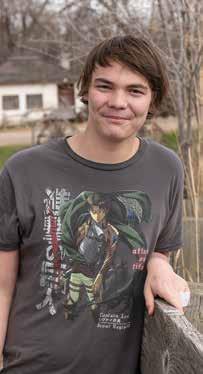
















By Gary Moore
What’s the single most important thing you can do for your relationships? It’s a great question – especially if you use it to address your own marriage. What’s the answer? I’ve got several book titles in my personal library purporting to answer this question – or at least a big part of it. Titles such as “Sacred Marriage”; “How to Speak Your Spouse’s Language”; “You Just Don’t Understand”; “Wired for Love”; “How We Love”; “Time-Starved Marriage”; just to name a few.
However, psychologists Drs. Les and Leslie Parrott have over their years of study and practice whittled down their answer to two words: get healthy. That two-word answer definitely deserves some unpacking. But first let me share with you a longer sentence they use to sum up their position: If you try to build intimacy with another before you have gotten whole on your own, all your relationships become an attempt to complete yourself. Why? Because nobody was designed to complete you. Not a friend, colleague, family member, or even your soul mate. Nobody can do that work for you. Nobody in your life is a shortcut to personal wholeness. They can help you as iron sharpens iron, but ultimately you are the one who must do the work on your own to become psychologically, emotionally, and spiritually whole. And when you do, your everything changes. Why? Because your relationships can only be as healthy as you are.
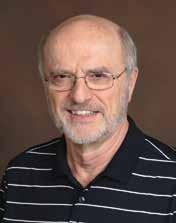
The healthy person is far from perfect. However, they are committed to seeing themselves truthfully. Authenticity is the key. The whole person integrates the good and bad, the light and dark, the pain and healing.
The Parrotts say there are three hallmarks of health that have stood the test of time: (1) profound significance; (2) unswerving authenticity; (3) self-giving love. You can think of health and wholeness as getting right with God (significance), getting right with yourself (authenticity), and getting right with others (love). These three hallmarks of health apply to everyone across cultures and over time. In fact, these hallmarks have been bandied about for centuries.
Speaking of the value of significance, for example, Augustine in AD 391 said, “God loves each of us as if there were only one of us.” Speaking of authenticity, Jesus said to His followers, “What will it profit a man if he gains the whole world, and loses his own soul?” And speaking of selfgiving love, in 4 BC Seneca said, “If thou wishest to be loved, love.”
All three hallmarks of health – significance, authenticity, and love – are essential for wholeness. They build on one another. And they stand like a tripod. If one leg is missing, wholeness topples. Without significance, you’re insecure. Without authenticity, you’re phony. Without love, you’re indifferent.
“The healthy person is far from perfect. ... The whole person integrates the good and bad, the light and dark, the pain and healing.”
Your relationship doesn’t necessarily need more skills, tips, or tactics – although those have their place. What your relationship needs most is something deeper, something stronger, something that has more to do with your being than your doing. Your relationship needs emotional health.
You may be single or married, young or old. You may live a charmed life or suffer unthinkable challenges. Whatever your baggage or background, there’s one thing I know about you. Each moment of every day you are moving either away from or toward the person God designed you to be. As a result, either your inner self is deteriorating into something unattractive, or it is quietly becoming a work of art. You are either maximizing your moments or allowing them to slip by without notice. And remember, there are no neutral interactions with people – particularly your spouse.
No matter your age, stage, faith, or career, all of us, if we choose, are on a journey of wholeness. It’s a process that never ends. Nobody checks this task off their to-do list. Nobody ever “arrives.”
Being healthy is not the same as being happy. But you can’t be happy without being healthy. And as one of my college professors so aptly said, “There’s a lot more to health than not being sick.” Emotional health is more than the absence of dysfunctional emotions. Healthy people contend with depression, stress, anger, anxiety, and all the rest, but they manage their emotions.
Let me give you an exercise that will help you become more self-aware. It may well be the single most important thing you ever do to become healthy. For the next week or so, ask one or two people every day (never asking the same person twice) a simple question: “Is there one thing about me that I don’t seem to see but you do?” Remember, you are on a fact-finding mission. So, if you think the person is off base, don’t become emotionally defensive. Simply say, “Thanks.”
Make a plan for processing the responses. Sometimes feedback will be objective; other times the information may be viewed through that person’s own lens and motives. Ask for specific feedback, and if you deem it as useless, so be it. Let your gut tell you what is valuable – and remember that the nearer to the core of your personality you probe, the stronger your resistance will be.
Above all, be patient with yourself. You’ll soon see your behavior more clearly as the false image of yourself gives way to a more accurate self-perception.
Enjoy the “healthy journey.” n
Gary Moore served as associate pastor at Cloverdale Church of God for 15 years. He does couples’ coaching and leads couples’ workshops and retreats called MUM’s the Word. He has a weekly radio program – Life Point Plus – on KBXL 94.1FM at 8:45 a.m. on Fridays. His website at www.mutualunderstanding. net has video teachings and other resources for couples. He may be contacted at glmoore113@gmail.com.

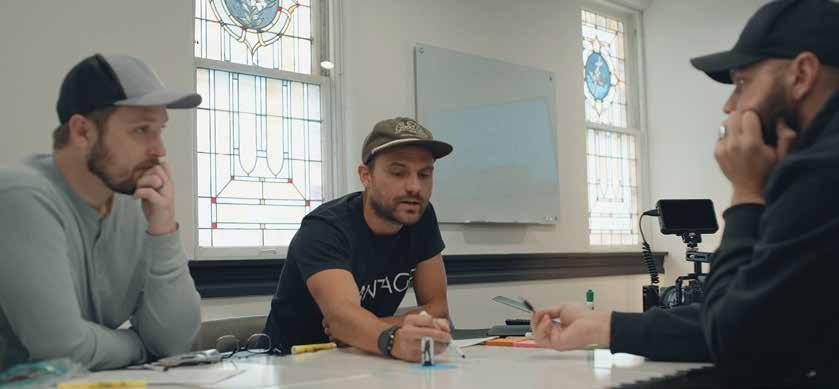
By Steve Bertel
Whether it be learning from an informative DIY tutorial or simply wasting time checking out someone’s silly antics posted on YouTube, it’s safe to say videos – especially short videos – have become commonplace in our society.
They can teach. They can entertain. And, in the case of videos produced by the Boise-based non-profit Christian film production group Vantage Stories, they can give us a better understanding –and a more personal understanding – of the Word of God.
In his early years, Vantage Stories’ founder Andrew Branham developed knowledge, traits, and skills that would later come to play in his life as a film producer. Only he wasn’t aware of it at the time. He grew up a preacher’s kid in a small church in Fairbanks, Alaska, often watching his father work behind-the-scenes writing and rehearsing sermons, and organizing church camps and such. “Plus, like any kid, I liked watching movies and TV shows,” he pointed out. After graduating from high school in 2006 and, with aspirations of becoming a minister himself, he moved to Idaho and attended Boise Bible College.
After his freshman year, Andrew accepted a summer job for the Bible College as a camp counselor. Which made his life rather hectic. “We were going non-stop every week for three months, working at twelve camps in twelve weeks. Plus, we travelled all over the Northwest; we’d be in a different state every week, finishing the final two weeks in Alaska,” he said. “At that time, I was probably the closest to God as I had ever been; I was absolutely desperate for His strength and provision.” Desperate because not only were he and his companions volunteering at the camps, helping out wherever they could, Andrew was often called upon to be the main speaker to recruit students to attend the Bible College.
Andrew also remembers, “Going into that summer program, I had been advised by a friend to write in a prayer journal every day. ‘Because,’ my friend told me, ‘what God is going to do over that summer will change the course of your life.’”
And it did.
“Halfway through that summer, I remember very clearly God speaking to me; He wanted me to drop out of Bible college, move to Australia, and pursue an acting career,” he said. It was certainly unusual, since Andrew had not taken drama classes growing up, nor did he have any direct film industry experience. What’s more, the folks at the college’s admission office – after Andrew shared with them what God had told him – didn’t think “it was wise” for him to leave school and pursue a career: a) clear on the other side of the world, and b) one where very few people truly succeed.
But Andrew was undaunted. He bought a plane ticket to Sydney, connected with a talent agency there, and starting studying acting. “I had to learn everything myself. I read a lot of books and plays and monologues to better my craft, because I truly felt God was guiding me to do that,” he stated.
Andrew auditioned for acting school, but was not accepted. He went to auditions every week, but never landed a role. After a while, frustrated, he asked God, “Why did you tell me to do this? This all seems like such a waste of time!” He felt his dreams of becoming a successful actor had been dashed.
But God had other plans.
Finally, after a year of spinning his wheels, Andrew gave up. He moved back to Boise, returned to school, and started serving alongside his brother, Josh, at Boise’s Pursuit Church – where Andrew eventually became the youth ministry pastor working to teach the Bible to the church’s junior high- and high school-age students.
“Josh and I started asking ourselves, ‘How can we bring the Scripture to life for these kids in a way that makes it feel real?’” he recalled. So, instead of writing sermons, the brothers wrote scripts – which they performed live. The scripts would be from the first-person perspective of different Bible characters. And it wasn’t long before “We were playing the roles, representing certain Bible characters, in front of students at camps, conferences, youth groups, and other faith-related events,” he stated.
In fact, the students were often so touched by the performances that, as Andrew put it, “After a show, they would come up to us and say, ‘Wow. I can’t believe that happened to you!’ And we’d explain to them, ‘No, it didn’t. It’s a story from Scripture.’ So, in that sense, we were achieving our goal; we were presenting the Bible to them in a way that felt real, that brought the stories to life.”
For years, the brothers continued their live performances, teaching Bible stories, performing as Bible characters, doing exactly what they truly felt called to do.
Then God opened another door.
The two found themselves in such high demand that, in 2018, they were called upon to give two Sunday service performances at Pursuit Church’s two campuses, one in downtown Boise, the other in Meridian. At the same time. “At first, we thought ‘This can’t work,’ because everything we had written was designed to be performed live on a stage. So it forced us to figure out a way to tell the story at the same time in two locations,” Andrew explained.
The answer? Shoot one performance – an actor delivering a monologue as Zacchaeus, the tax collector – on video.
So Andrew reached out to local videographer Joseph Morgan for advice. As Andrew remembered: “He asked me, ‘How long is this film going to be?’
“I told him, ‘About five or ten minutes.’
“He said, ‘No. There’s no way you’re going to keep people’s attention that long with a single monologue.’”
But, deep down inside, Andrew knew differently. He knew God was leading him.
“One of my filmmaking heroes is [acclaimed secular screenwriter, producer, and director] M. Night Shyamalan,” Andrew said. “He incorporates monologues very well into his full-length feature films; in fact, it’s not uncommon for his films to have a two- or threeminute discourse by one of the characters, which always hits home for me and gets me a little teary-eyed.
“I knew, in order for our film style to work, we had to do the same thing; we had to make the Zacchaeus character feel real, and make the audience feel like they were stepping into his life,” he said. So, undaunted yet again, Andrew and his team shot the monologue on video. Then, while editing it, Andrew said, “We discovered there were things we could do on film that we couldn’t do in a live presentation: we could get up close and personal with the actor, catching his inflections and gestures; we could add music and sound effects and B-roll [footage]; essentially, creating aspects of the story that we couldn’t on the stage.”
After Joseph Morgan saw the finished product, he told the guys, “Wow. I stand corrected. That was riveting!”
Audience feedback of the short video was just as strong, if not stronger, than the reactions to their live presentations. Soon, requests started coming in from people even outside the Boise area wanting to see more of their videos, more “humanized” Bible stories. That “accident” – as Andrew called it – of the two conflicting performances “got us thinking, ‘Huh. Maybe there’s something more to this.’”
And there was.
“After a while, it got to the point where my church job became unsustainable for me,” Andrew stated. “So I resigned. The church paid me for my remaining vacation and holiday time, and I invested that money into what later became our next film project.”
Unlike the cutthroat competition of Hollywood, Christian filmmakers “have each other’s backs. They aren’t in competition with each other,” he explained. “They all really want each other’s project to succeed.”
So, seeking technical direction for his new venture, Andrew reached out to successful Boise Christian filmmaker and documentarian Steven Siwek, Jr. and professional sports videographer Ronn Seidenglanz. “In a very short time, Steven helped me learn how to scout film locations, how to create call sheets, how to figure out a wardrobe, how to write a stage script in such a way so that it translates well on the screen, all of that. He really became a mentor to me.” And when he pitched Ronn on the idea of telling stories from the perspective of Bible characters “in a way that’s not cheesy,” in Andrew’s words, “then showing them at church events or posting them online for everyone to see,” Ronn quickly came on board as the group’s filmographer.
And Vantage Stories was born.
“When my brother and I created the original monologues, we called the series Vantage Point because the old Jewish rabbis used to teach that Scripture is like a gemstone. If you hold a gem up to the light and look at it, it looks one way; but if you turn it, it refracts the light and you see it differently each time. And it’s always beautiful. I believe that’s how we should encounter Scripture. So, instead of being on the outside looking in – as a scholar, we wanted to take people on a journey, to bring them into the pages of Scripture and experience it from the character’s perspective. That’s the idea behind the name Vantage Stories,” Andrew explained.
For their first project, they found an actress who had had some independent-film experience, wrote a script – this one, telling the story of Rahab, the woman who helped Joshua’s spies and, within two weeks, were shooting “Rahab” in the Boise foothills. “To this day, that video has received over 100,000 views on YouTube. It’s been our most successful film,” Andrew commented.
To date, Vantage Stories has produced ten theater-quality, highdefinition videos, each titled with the name of the Bible figure they “bring to life”; each with an original music soundtrack from the team’s composer, Kyler Daron of Den Studios Recording; and each taking several months to produce, from beginning to end.
The money for each slick Vantage Stories video is crowdfunded even before the cameras roll. Or, as Andrew pointed out, “‘The ‘Saul/Paul’ and ‘Rahab’ videos we shot in 2020 were produced on a budget of between $5,000 and $10,000 which, to some people, may seem like a lot of money. But it’s not when you realize the average cost to produce a Christian film today is about $1,000 a minute, and the average cost to produce a Netflix series can cost as much as $100,000 a minute.” The money goes toward airfare to fly the professional actors into the Boise area (where all the videos are shot), talent salaries, and miscellaneous crew expenses. But mostly, the productions are staffed by volunteers. “Even Bev Holloway, the casting director of the highly-acclaimed Christian television series The Chosen, and a number of motion pictures, volunteers with us,” Andrew pointed out.
Continued on page 23
By Doug Hanson
What can we learn from the story of Abraham in Genesis 21 about protecting our wealth? The crux of the story is Abraham’s gift of seven ewe lambs to King Abimelech.
Abraham and Abimelech’s relationship started in Genesis 20, when Abraham moved to an area called Gerar which was ruled by the king. Abraham, concerned that he would be killed because of his wife Sarah (anticipating the king may want Sarah for himself), passed Sarah off as his sister. Abraham anticipated correctly, and Abimelech took Sarah. But before consummation, God came to Abimelech in a dream, explaining the true relationship between Abraham and Sarah, and sternly warning him not to proceed unless he wanted to face dire consequences: “Now return the man’s wife, for he is a prophet, and he will pray for you, and you will live. But if you do not return her, you may be sure that you and all who belong to you will die” (v. 7).

Abimelech was so frightened that he returned Sarah, gifted Abraham and Sarah with riches and gave them permission to live in the land.
That brings us to the subsequent interaction in Genesis 21. Without Abimelech’s knowledge, his servants seized a well dug by Abraham. Abraham brought this to the attention of Abimelech, who quickly rectified the situation. To confirm that the well was for Abraham’s use, they made a treaty. In response, Abraham gave seven ewe lambs to Abimelech to ratify the treaty.
What do seven lambs, a well, and a treaty have to do with protecting our wealth today? Abraham had spent considerable effort to dig the well, anticipating the future use of it. Likewise, we can spend our lives investing for retirement, anticipating the use of our investments in retirement. But, as we near retirement, or are in retirement, we may need to take steps to protect those investments, just as Abraham took steps to protect his “investment.”
Sequence risk, also called sequence of returns, can be an enemy of investments in retirement. It occurs when a person is invested in stocks or stock mutual funds and takes regular withdrawals while the stock market is in decline. If the stock market begins a long upward trajectory, damage will still have been done to the portfolio. Even in the long-term, the portfolio will have a hard time recovering from the initial decline and withdrawals.
How can a person in retirement reduce the risk of sequence of returns? One approach is to put a portion of their overall portfolio into more protected investments – investments that reduce the chance of loss. For example, a fixed annuity (FA) offers a fixed return for a specific time. Even if the stock market declines, the fixed annuity will increase in value.

A variation is a fixed index annuity (FIA). With a fixed index annuity, there is protection against loss plus participation in market gains. The investment is generally tied to the performance of a market index, offering greater potential for gain than a fixed annuity. If the index does well, the fixed index annuity does well. But if the index declines, the fixed indexed annuity does not.
Another variation is a registered index-linked annuity (RILA), which is also tied to the performance of the market and offers the opportunity to capture positive index returns up to a limit (cap rate), while providing a level of protection (buffer) if the index return is negative. In a sense, there are guardrails on the investment with a maximum potential for gain combined with a maximum potential for loss. Another way to reduce sequence risk is to increase the percentage of bonds or bond funds in a retiree’s portfolio. Bonds are less volatile than stocks, which means the potential for gains and losses is narrower, which translates into more protection from sequence risks for investments.
Abraham’s gift of seven ewe lambs to King Abimelech protected his well for the future; Abraham could anticipate using the well for years to come. The effort he made to dig the well, combined with the protection of the treaty, provided him confidence in future access to the well. How confident are you in future access to your retirement investments? Consider how Abraham’s gift of seven ewe lambs to protect his investment may translate into how you can protect your investments today. n
Doug Hanson is an investment advisor with Christian Wealth Management in Boise, providing biblically responsible investment advice to Christians. For more information, visit investforthegloryofgod.com or contact him at doug@christianwm.com or (208) 697-3699.
Investment advisory services provided by Creative Financial Designs, Inc. Securities are offered through CFD Investments, Inc., Member FINRA & SIPC. 2704 South Goyer Road, Kokomo, IN 46902, 795-453-9600. Christian Wealth Management, LLC is not affiliated with CFD Investments, Inc. or Creative Financial Designs, Inc.

Continued from page 21
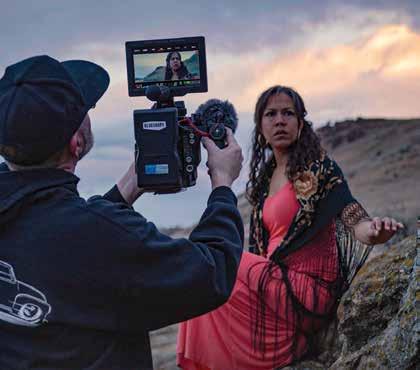
And the videos remain free online. “Some may be a little too edgy for church services. We totally get that. We don’t expect them all to be used in that context,” he said. “We want these videos to be seen by people who normally wouldn’t be in church on a Sunday morning. That’s why we make them available for free. There’s no app to download. There’s no plan to subscribe to. We just put them out there for the world to see – and people to be changed by.”
Comments on their YouTube channel bear that out. “We hear, more than anything else, comments like, ‘I just stumbled across your video, and now I’m in tears! God is so good!’” Andrew added.
In addition, the team’s work has received national accolades – twice – at the Christian Worldview Film Festival. Last year, “Magdalene” won the International Impact Award and, this year, the crew won Best Short Documentary honors for its change-of-place video, “The Gift of Cancer.”
Today, between their full-time ministerial jobs – Josh Branham is now the lead pastor at Boise’s Hill City Church, and Andrew is the family pastor – the two stay busy balancing their pastoral duties, their family lives, and their deep-rooted film production calling. Reflecting on Vantage Stories’ past projects and looking ahead to their future projects, Andrew said, “You know, people in the Bible were just like us. They were real. They felt emotions. They were far from perfect. I believe that was intentional on God’s part. When we read or hear their Bible stories, God wants us to see ourselves in them … and He wants the Bible to come alive for us. That’s what we’re trying to do at Vantage.” n
To find out more about Vantage Stories and to view all the videos the group has produced, you can check out their website at www.vantagestories.com.
Steve Bertel is a multi-award-winning professional radio, television, print media, and social media journalist, who retired after a 30-year broadcasting career. Now a busy freelance writer, he released his debut suspense novel “Dolphins of an Unjust Sea,” available on both Amazon and Kindle. Steve and his wife of 41 years live in Meridian, Idaho. He can be reached at stevebertel65@gmail.com.





By Roxanne Drury
Some people ease into retirement like putting on an old favorite comfortable robe. They settle in all warm and cozy ready to sit back, relax, and enjoy their new life of freedom. That would be my husband. Other people, me for example, find nothing easy or warm and cozy about it. For them, it is more like putting on a girdle. There is tugging and pulling and sucking in and it is not comfortable in the least. Men, you might not completely understand the girdle analogy, so imagine putting on a compression sock.
I had been talking about retiring for years but could never get the nerve to do it. What in the world would I do during all those empty days? It was frightening to me. I had been working since I was 14 years old. It was very much a part of who I was. My identity was wrapped up tightly in my retail, insurance, education, and church work jobs. What I did was who I was. News flash! That is a lie. I have found that I am so much more than what I did. And so are you! Our work, no matter where we work or what we do, does not define who we are. What defines us is who we belong to! I belong to Jesus. You belong to Jesus. We are His – that is what defines us. Now that we have that settled, let’s move on.
If you haven’t guessed already, I recently retired. My transition out of the workforce was like putting on a girdle. The struggle was






genuine. On some days it was debilitating to the point of full-blown meltdowns. And yet, I knew I had done the right thing. It was the right time for me to retire. In talking to other retirees, I learned that this emotional roller coaster was a real thing upon retiring. Many people had the same type of girdle experience. For some people it lasts weeks, as in my case; for others it can take much longer to get to that settled state of life as a retiree.
You may be in the same boat as I was – retired and figuring it out. I want to offer some tips to help you journey to the old favorite comfortable robe type of retirement transition. The girdle transition was not fun!
Here are four steps to help you ease into retirement (I share these from what I learned through my personal experience):
1. Keep God in the equation! Keep reading your Bible (or start). Keep praying for guidance.
2. Plan ahead – financially, physically, and relationally.
a. Make a budget for your life without your paycheck.
b. Dream and use your imagination to see what your life could look like with all that time on your hands. Will it include travel? Visits to kids and grandkids? Going back to school? Writing a book?
c. Use your health benefits to do all the medical things you have been putting off.
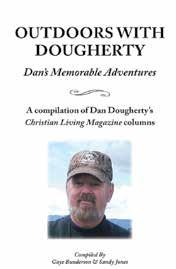
This tribute to our friend & colleague is a compilation of all his articles; Dan’s personal photos &
even some that were never
You’ll thoroughly enjoy this walk down memory lane. Order Your Copy Today
d. Reconnect with old friends that you haven’t had time for. Make permanent plans to get together with those you worked with and with whom you have a strong relationship.
3. Plan for now. What will you do daily? How will you keep life fun?
a. Create a “Retirement Daily Routine” – replacing the get-up and go-to-work routine with a new special “Retirement Daily Routine” is important. What time do you want to get up? Which day is laundry day? Create a weekly meal plan, etc. These things will help keep you on track and help make life seem more normal.
b. Stay active and intentional, not just busy. Join a gym, find a walking partner, make lunch dates, volunteer somewhere, start a Bible study group, etc.
c. Find a new hobby or renew an old one. What is something you have always wanted to learn or used to love to do? You have time now.
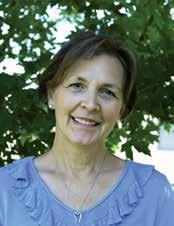
4. Plan for the future. What do you want the rest of your retired life to look like?
a. Find your purpose again. What cause can you champion? Search for what God might have for you to do for His Kingdom.
b. Redefine who you are through re-discovering old passions or finding new ones in this phase of life. Your passions are part of how God made you. We need to feed those passions. They have a purpose.
c. Schedule some of the things you dreamed of in Step 2.
d. Re-ground yourself through consistent Bible reading and journaling or meditating on the Word.
e. Keep learning and keep growing, and don’t give up.

Amenities:
■ Secure Entr y
■ Community Room With Mont hly Games & Activities
■ Elevators
■ On-Site Laundr y
■ Outdoor Patio Space & Community Garden
■ Some Rooms Have Private Balconies
■ Close To Shopping, Librar y & Downtown Nampa
■ All Utilities Are Included With Rent (Except Int ernet And Phone)
MUST BE AGE 62+ to apply for those who are income qualified.
Sec tion 8 housing voucher holders are preferred & strongly encouraged to apply!
With retirement comes a transition time. It can be easy or it cannot be easy. These steps will help make your transition easier. Never one to do something the easy way, I have experienced the Retirement Girdle Transition. I offer to you what I learned from that experience in hopes that it will prevent you from doing the same. I must say, and my husband will attest, that it was ugly!
God has a plan for each of us. I discovered that His plan for me changed when I retired. And that is okay. I (we) can embrace changes when we know they come from The Master Planner. Whether retired or not, His desire for us is to follow His plan. He promises to continually love and guide us through all the transitions in life. Trust Him in that. His word promises: “I will be your God throughout your lifetime – until your hair is white with age. I made you, and I will care for you. I will carry you along and save you.” – Isaiah 46:4
You’re retired! So, now what?
1. Keep God in the equation.
2. Plan ahead.
3. Plan for now.
4. Plan for the future.
Then find that old favorite comfortable robe and relax and enjoy your newfound freedom. n
Roxanne Drury is a wife, mother, grandmother, and retired Christian preschool teacher who served the Lord in children’s ministry for over 45 years. She has written a group study guide on Psalm 23, as well as other books. She may be reached at glorylandbooks@gmail.com.

By Dr. Rick Chromey
Thomas Jefferson was always a believer. Being Virginian, Jefferson was baptized, married and buried Anglican, as were his children. His early writings, including the Declaration of Independence, reflected his faith.
Then his wife Martha died. And the depressed Jef ferson moved to France, where he indulged to salve his loss.
When Jefferson returned to America, he was different. His “French sensibilities” were evident, allowing critics to pounce. Had he become another “infidel” like Thomas Paine? Did the secular French Revolution turn Jefferson agnostic?
The 1800 presidential election between John Adams and Thomas Jefferson proved a bitter battle of rank partisanship. Political adversaries harshly called Jefferson an “atheist” (suggesting disloyalty to God and America). Fearful clergy targeted Jefferson as a tyrant who’d steal Bibles, close churches and abolish “freedom of religion” in America.
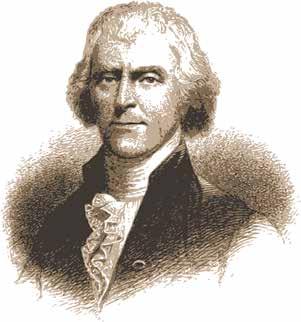
None of it proved true, but the allegations crushed Jefferson. When he couldn’t silence the critics, Jefferson vowed to never speak openly about religion again. And except for occasional correspondence with trusted friends, Jefferson kept that promise (providing critics additional ammunition).
Jefferson regularly attended church throughout his life. Prior to his wife’s death and subsequent disillusionment with his ecclesiastical Anglican heritage, Jefferson and his family were faithful congregants at their Episcopal church.
In 1801, President Jefferson attended church services in the new U.S. Capitol church. At that time, Washington, D.C. was young and without churches. One of Congress’s first acts in the “people’s house” was to permit [non-denominational] services in the Capitol, employing Congressional chaplains. American author and political commentator, Margaret Bayard Smith, wrote:
“During the first winter, Mr. Jefferson regularly attended service on the sabbath-day in the humble church. The congregation seldom exceeded 50 or 60, but generally consisted of about a score of hearers. He could have had no motive for this regular attendance, but that of respect for public worship...” 1
Multiple congregants recounted how Jefferson rode his horse to church, no matter the weather. 2 Jefferson and his secretary (Meriwether Lewis) even enjoyed reserved seats. 3
The U.S. Capitol church services continued throughout the 19th century. It was a church to presidents, congressmen, federal judges, D.C. aristocrats and influential clergy. By 1857, weekly attendance reached 2,000.4
Arguably, it was America’s first non-denominational “megachurch”.
In the early 1800s, British Unitarianism arrived in America and many Founding Fathers favored it, including Jefferson. Primitive Unitarianism questioned the Triune Nature of God and Jesus’ Pre-Existence. Naturally, such divisive doctrines riled the Catholics, Presbyterians and congregationalist churches.
The Unitarian view carried enough baggage that Jefferson eventually distanced himself from it. He never placed membership nor
converted to Unitarianism. According to one early Jefferson biography, in 1803, he issued a paper to help his family handle “the libels published against him.” 5 Historian Henry Randle
“...towards the close of [Jefferson’s] life he occasionally cut short all further inquiries or remarks tending towards discussion on the subject of religion... [particularly] saying he was Unitarian... [rather his grandchildren] heard him habitually speak reverently of God, the Saviour, and the great truths of Christianity.” 6
It’s true that Jefferson briefly corresponded with Unitarians (like Joseph Priestley) and attended occasionally a Unitarian church (in Philadelphia). He also spoke enthusiastically about Unitarianism to one Christian friend. But the evidence remains scant. Jefferson’s later religious activities and statements imply he’d moved on. Unfortunately, with few letters and family testimony, it’s difficult to know with certainty Jefferson’s religious convictions.
Nevertheless, his family and friends provide clues.
Remember those church services Jefferson attended at the U.S Capitol in 1801? Evidently this small gathering exploded into a “sabbath-day resort” for anyone of all classes and creeds to attend. This church boasted:
“Preachers of every sect and denomination of christians (sic), were there admitted – Catholics, Unitarians, Quakers with every intervening diversity of sect. Even women were allowed to display their pulpit eloquence...” 7
Was this Jefferson’s ideal church? Perhaps. It’s the type of church he seemingly attended post-retirement. While Jefferson maintained certain Anglican, and possibly Unitarian, convictions, he was spiritually eclectic. Refusing membership to any church, Jefferson claimed to be a “sect of himself” 8 ...a “disciple” of Jesus’ doctrines who affiliated with all in the Church of Christ. 9
Ironically, a new type of church was birthed in the Second Great Awakening (1790-1840) that spread like wildfire. It was a nondenominational fellowship of congregations known as “Christian churches” seeking to restore “primitive Christianity.”
These “restoration churches” – like Thomas and Alexander Campbell’s Pennsylvania “disciples” or Barton Stone’s Kentucky “Christians” – sparked a sea change in American Christianity. For Jefferson, it was probably an ex-Methodist-Episcopalian preacher named James O’Kelly who introduced him to “primitive” Christianity. Jefferson was certainly aware of this movement. And liked what he saw.
After retirement, Jefferson favored nondenominational congregations. He wrote about one church he visited that met at a local courthouse. The service attracted Episcopalians, Presbyterians, Methodists and Baptists, among others. According to Jefferson, they “[joined] in hymning their Maker, [listened] with attention and devotion to each other’s preachers and all mix in society in perfect harmony.” 10
These “restoration” churches – from Virginia and Pennsylvania to Ohio and Tennessee – were rooted to unity like the early church. And that was attractive to Jefferson. In an 1822 letter, he wrote:
“I am looking with anxiety to see the dawn of primitive Christianity...where, if it once appears, it will soon beam like the rising sun, and restore to reason her day. ‘Thy kingdom come’ is therefore my prayer; and my confidence is that it will come.” 11
Consequently, the “church” for Jefferson wasn’t a priest-driven denomination but rather the “primitive” Christianity preached through a unifying principle: “In matters of faith, unity; in matters of opinion, liberty; in all things, love.”
This theology blended with Jefferson’s philosophical view for America – a people E pluribus unum (out of many, one); a unified nation which honored individual “liberties” that seeded “life” and “happiness.”
It was a church of the people, by the people, for the people.
And seemed to be the “church” Jefferson found in his final years. n
Dr. Rick Chromey is an historian, author and speaker who helps people interpret history, navigate culture, and explore faith. Since 2022, he’s worked as a Lewis and Clark historian for American Cruise Lines on the Columbia and Snake rivers. He is available to speak to churches, schools and organizations about topics related to history, apologetics, leadership and Christian education.
Christian Living readers may use the QR code to subscribe to Dr. Chromey’s inspirational (history, culture, faith) Morning MANNA! (M-F) email. www.mannasolutions.org
Sources:
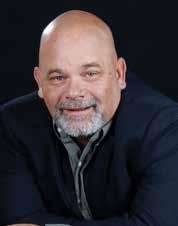
1) Mrs. Samuel Harrison Smith (Margaret Bayard), The First Forty Years of Washington Society, Galliard Hunt, editor (New York: Charles Scribner’s Sons, 1906), 13.
2) One congressman recorded: “It was very rainy, but his ardent zeal brought [Jefferson] through the rain and on horseback to the Hall.” William Parker Cutler and Julia Perkins Cutler, Life, Journal, and Correspondence of Rev. Manasseh Cutler (Cincinnati: Colin Robert Clarke & Co., 1888), II:119, letter to Joseph Torrey, January 4, 1802.
3) Harrison Smith (Margaret Bayard), First Forty Years of Washington Society, 13.
4) James Hutson (Chief of the Manuscript Division of the Library of Congress), Religion and the Founding of the American Republic (Washington, D.C.: Library of Congress, 1998), 91.
5) Henry S. Randle, The Life of Thomas Jefferson, Vol. 3: 561.
6 )Ibid.
7) Harrison Smith (Margaret Bayard), First Forty Years of Washington Society, 15.
8) “Thomas Jefferson to Ezra Stiles Ely, 25 June 1819,” Founders Online, National Archives, https://founders.archives.gov/documents/Jefferson/03-14-02-0428.
9) Jefferson wrote Charles Thomson: “I am a real Christian, that is to say, a disciple of the doctrines of Jesus, very different from the Platonists, who call me infidel, and themselves Christians and preachers of the gospel, while they draw all their characteristic dogmas from what it’s Author never said nor saw...” “Thomas Jefferson to Charles Thomson, 9 January 1816,” Founders Online, National Archives, https://founders. archives.gov/documents/Jefferson/03-09-02-0216. One of the key teachings of early “Christian Churches” and “Churches of Christ” (primitivist “restorationalists”) was a dissolution of their denominations into the Universal Body of Believers. The name was never viewed as a limiting name for a local church body.
10) Sanford, Religious Life of Jefferson: 5.
11) “From Thomas Jefferson to Benjamin Waterhouse, 15 October 1822,” Founders Online, National Archives, https://founders.archives.gov/documents/Jefferson/98-01-02-3095
Fill in each answer, one letter per square.
Then ar range t he letters in t he highlighted squares to reveal t he name of
1. She had six sisters
2. Colossians reminds us that in “W hatever you do, work at it with all your ___, as work ing for the L ord, not for human masters …”
3. He wa s on the r un in the Desert of Ziph
4. Isaac’s wife___
A KING OF JUDAH is … HEZEKIAH (2 Chronicles 29:1, 30:24)
VIDDA (1 Samuel 23:14) 4. REBEKAH (Genesis 25:20)
1. ZIPPORAH (Exodus 2:15-22) 2. THEAR (Colossians 3:23)
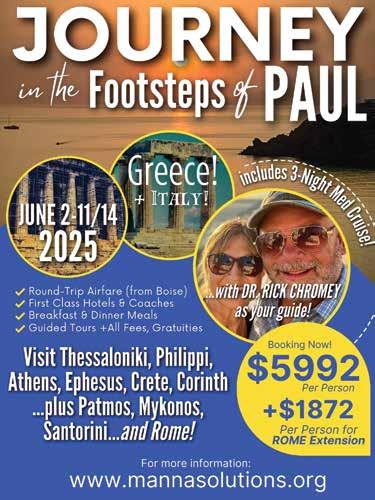
By Gaye Bunderson
Bryan Kida, an advisor to the Caldwell Mayor’s Youth Advisory Council and a Community Outreach Specialist, actually leads two youth groups. One is at his church and the other is part of the mayor’s program to reach young people in the community, whether they are walking in faith or not. One group is church-based and the other is secular.
“There are some differences that I see in the two groups,” Kida said. “Although their circumstances are very different for the most part, the non-church group seems to have a greater thirst for something.”
The Council seeks to help them fill that void.
Kida’s journey to the mayor’s office started in 2020, when he and his wife, Porshe, moved to the Caldwell area from San Diego, where Kida worked as an executive assistant to the executive team at San Diego Christian College.
“It was really scary [to move],” he said. “But a lot of impossible doors opened to get here. The last door was we got a house, and we said to each other, ‘I guess we’re moving here’.”
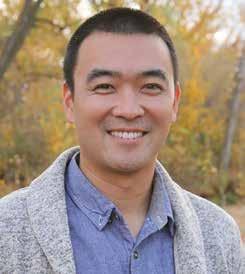
Bryan Kida is an advisor to the Caldwell Mayor’s Youth Advisory Council and leads two diverse youth groups: one a secular group with MYAC and another youth group based at the church he attends. He sees differences and similarities between the groups but wants to impart a sense of service to community to both of them. (Photo by Julia Ruis)
Despite the fact that 2020 was the year the pandemic was sending folks to the sick ward and into social isolation and mask mandates, Kida nonetheless said, “I appreciate that period a lot. God was telling us to thrive, not just survive.”
The couple came with the goal of helping plant a new church and were on the local launch team of Refresh Church. Kida was asked if he was comfortable leading a church youth group, an area he’d had experience in, and he said “yes”. The Kidas brought other experience and education to their work here. He earned a business degree from the University of California-Riverside, and she went to San Diego Christian College, earning a degree in Christian ministries, and is finishing a Master of Divinity from Liberty University. He’s 38 and she’s 33.
Kida started his job with the mayor in September of 2022 after working in Boise. Currently, the Council includes 85 students representing 15 schools. Regarding the Council, Kida said, “Think ‘youth group for the city’.”
He and Mayor Jarom Wagoner are the only advisors so far, and the entire program was the brainchild of former Caldwell mayor Garret Nancolas. The current mayor had the following to say about the project:
“I am often asked, ‘What is the Mayor’s Youth Advisory Council or MYAC for short?’ Plain and simple, it is a program that changes lives. Over the 25+ years of its existence, it would be difficult to count the number of lives that have been impacted for good by MYAC. Former Mayor Garret Nancolas know doubt had a vision for MYAC when he created it, and I can attest to the manifestation of that vision. The youth that comprise MYAC will not only change our world for the better in the future, they are already doing that right now as teenagers. It is one of the most successful programs I have even been a part of.”
The Youth Advisory Council is not part of city government and its not taxpayer-funded. There is no Bible study. The idea is to reach Council members with positive examples and give the kids opportunities to serve others. Kida and Wagoner act as two adults who encourage and guide the youth.
“The mayor and I work well together. We’re after a lot of the same things. He loves the youth. The mayor is a servant leader,” Kida stated.
The Youth Advisory Council is for students in the 8th through 12th grades; they can live anywhere, not just Caldwell; and it’s free to participate.
Explained Kida: “We do community service projects, including helping the Salvation Army hand out turkey boxes during Thanksgiving; a Refugee Welcome Group that gives out ‘welcome kits’; and a Rake Up Caldwell project.








“The main thing is the Council is all student-led – what they want to learn and what direction they want to go. They’re organizing all this; I’m there just to guide.”
He and the mayor speak in schools, encouraging students to come be a part of the Council.
Perhaps not surprisingly, some of the youth who become Council members come from troubled homes. They come to the Council seeking community and looking for a place to belong, Kida said. He also stated that, though they may not be aware of it, students in both his church youth group and his city secular group, “all need Jesus badly.”
Sermons don’t happen at the Council events but examples are set about a life of faith through both Kida and the mayor. Kida also serves as a receptive ear to the young people who attend Council events.
“The students I work with, they talk about what happens in schools...a lot.”
He said he talked to an eighth grade girl last year, who told him at least half of the students are vaping. When he asked how they get it, she answered: some parents give it to them; some steal it; and the third way to get it is from a dealer.
So Kida talked to a school resource officer – “my co-workers for the city,” he said – to find out how accurate the girl’s statement was, and the SRO confirmed it.
And it can get worse.
“The students are extorting each other, and the currency is sexual photos,” Kida said, explaining this can reach all the way down to middle school.
He attempts to understand what underlies these behaviors. Obviously, home life is a factor, but Kida sees other factors also.
“There’s a lack of hope,” he said. “If a student understands their value, their worth, and has a purpose – knows God and His purpose for their lives – that would help.”




Kida has studied and is well-versed in the dangers of vaping, but he thinks the habit is just a symptom of something deeper. He stated, “Yeah, vaping is bad, but there’s something more than that. … A lot of kids live very unstable home lives. Who’s speaking into their lives? The message they’re getting isn’t very beneficial. A lot of students go home to nothing.”
Gangs are a whole other problem, and Kida and the mayor hope to bring kids into a better, healthier community through the Youth Council.
Kida and the mayor have gone into the juvenile detention center to visit youth, and they work to see the good in all the young people they encounter through all the programs. “They’re all great kids – one group doesn’t have three square meals a day, while another does.”
The Idaho transplant has no regrets over making the move with his spouse to the Caldwell area.
“Our community is great. I have great partners I’m working with to help the kids,” he said. “I’m glad I came here. It feels very familiar. The community is very similar to the one my wife and I left behind; the demographics and the things I’m seeing with the youth are similar. You see things that break God’s heart.”
He went through a time of his own not knowing what God’s purpose was for him.
“I went through a really deep depression when three people in my family all died in a row. I was going to a small church. I was in the fifth grade – God just met me there in my sorrow,” he said. “But I just didn’t have anyone to teach me. I went to Greg Laurie’s church and a church called High Desert Church in Victorville, Calif. Finally, when I was 21 or 22, that’s when I understood what Jesus’ purposes meant for my life.”
Blessings came from that, and he wishes others to have the same experience as well. His work with two diverse youth groups keeps him aiming high. For both himself and the young people. n





By Gaye Bunderson
Mitch Hodge claims he was born with an edge to him and by that he could mean he’s a lot like the sharp side of a blade.
“When I was young, I was a normal kid. I played with GI Joes,” the now 60-year-old Hodge said. “But when I turned 13 or 14, I was a partier. Then when I got out of high school, it increased.”
Still, Party Boy Hodge pursued athletics and had a try at college football.
“I had hopes and dreams,” he stated.
However, his bar-hopping lifestyle got the better of him when his friend, Evan, got stabbed in a bar fight. The 21-year-old former Marine didn’t survive the altercation, and though Hodge survived that particular night, a part of him was nonetheless deeply wounded. His own wounds would also be physical eventually, as he continued to pursue a dangerous nighttime scene.

“I’d go to bars every might; I’d stay there until 2 in the morning, go home, go to work, and end up back in the bar at 5 p.m.,” Hodge said. “When Evan got stabbed, I was full of guilt and shame. One year to the day after that, I went on a tangent. I had more violence, more anger.”
It was almost like he went looking for a fight, and he found one. He suffered multiple stab wounds from more than one person. He calls the brawl “an assassination attempt” on him.
His interest in athletics never left him and despite his nightly selfmedicating habits, he still worked out regularly. He was taken to the hospital after the stabbing. He was banged up and stitched up, but he survived. He was 21 years old.
“I crawled out of the hospital,” he said.
When he returned to the gym, he could barely lift 10 pound dumbbells. “I had three big holes in my chest, and holes in my left arm. … I was so stitched together.”
So how Mitch Hodge end up like this? My his own admission, there was nothing in his upbringing to turn him into an angry barfly looking for booze and a brawl.
“I was raised in a little town in America – Burley, Idaho. My parents were good people; they were not doing anything wrong,” Hodge said. He then summed up his proclivity for the sordid side of life by saying, “I didn’t have any brains.”
And not to be forgotten, he was born with that edge inside him. An edge that may have worsened over time.
Said Hodge, “My dad was larger than life. I tried to live up to his legacy. He was non-stop, very smart, and I just thought I could never live up to that.” Also, the communication between father and son wasn’t up to par. “My dad was old-school – our communication wasn’t what I needed.”
Old-school dads were often raised to be terse, not overly affectionate, and largely averse to displays of emotion.
Hodge’s life underwent tectonic changes as he matured, even though he still believes he retains some of the less desirable traits of his youth.
“For a long time, I couldn’t face life without alcohol. Then, bodybuilding became an addiction. I was all in – I was focused on being
the best in the world. My obsession back then had been to be noticed by everyone.”
He won a Mr. Idaho bodybuilding title.
But the better part of his personal story is when his priorities completely changed. And even that story starts out in a bar.
“I was a bouncer when I met a woman named Sarah in a bar. I was working in the bar and was a bodybuilder. I was trying to figure out God. I tried Buddhism, other spirituality.”
He and Sarah were close, but Hodge’s relational hangups soon got the better of him and he kicked her out of his life. She went off with another guy. Around this time, Hodge was invited to be in a football group connected to Calvary Chapel. During a game, he tore his arm up; and because of that, he was mad at God. He was taking painkillers and drinking beer to cope.
Out of the blue, Sarah called him. He admits now he was upset by the call and rudely asked his former girlfriend, “What do you want?”
She told him a story about how she was at Gold’s Gym and this guy kept staring at her. He wasn’t creepy, she said, but he was staring at her a lot. He eventually approached her and announced, “I feel like God is speaking to me about you.”
The stranger explained that he felt God was telling him to say to her, “You’ve had a hard time with men, and you never had a relationship with your father. Men always leave you broken and hurt. God wants you to know that He wants to be the man in your life, that you are loved and cared for by Him.”
Hodge said that, for Sarah, it was like a woman-at-the-well experience, the Bible story where Jesus told a woman at the well “everything she ever did.”
Hodge and Sarah made a decision to go to Capital Christian Center together, but as they were driving to the church on a Sunday, Hodge got a strange feeling. “God tore my bicep, and the closer I got to that church, my stomach was hurting so bad. … We went in, but I was so sick.”
Ken Wilde, senior pastor of Capital Christian, was speaking to a congregation of about 1,500 people during that service. Then, still standing at the front of the church, Pastor Wilde – moved by the Holy Spirit – said out loud, “There’s someone here today who’s been searching, seeking. You need to stop searching and give your life to God. Then you will find what you’ve been looking for.”
Hodge remembers the date – November 10, 1996 – and he firmly recalled, “I stood and walked to the altar. I received Christ and my priorities changed. I realized I needed Jesus in my life to realize what I was missing out of.”
He and Sarah got married; but unfortunately, that part of his life is not a happily-ever-after chapter. He said of the marriage: “It was a train wreck.”
He takes responsibility, stating, “I’ve always had trust issues. I’ve always been a lone wolf. With Sarah, I caused the relationship to self-destruct. She’s now happily married to a great Christian guy.”
It wasn’t to be the first time one of his relationships came apart, and he mentioned a woman named Shari. Without running away from his shortcomings as a man and husband, he stated, “My
relationship areas are an embarrassment to me. I go into self-preservation mode. I go into self-defense mode, protection mode. The solution is Jesus, but the sanctification process takes time.”
He doesn’t shy away from self-examination nor from the answer that has been his ultimate salvation: the Lord.
“I try my very best. I tell people about Jesus, that He is the absolute solution. He’s got a plan for your life. He’s that protective covering.
“I’m trying to be obedient – it’s joyful. When you slip out of His will, it’s miserable. The em powerment is the surrendering to Jesus.” But his caveat was this: “Jesus is not a genie in a bottle. This has been a 30-year journey for me. My ministry life is very successful, but my personal life is a failure. I can’t judge anybody. I’m the worst. The Holy Spirit has said to me, ‘Wake up and put your priorities in order.’ He has got to be your priority.”




Hodge even bluntly stated that at one point, he was “a self-centered egomaniac,” but he said that now, “I’m obsessed with the Lord. I’m humbled when He uses me. The desire of my heart is to be like Him, but I’ve scratched and fought, and I’m still working on being a good man.”
“It’s funny,” he stated. “I was told that in America, you can always start over.” And with the help of of His Savior, he’s started over more than once. His ministry successes are commendable. He owned a gym and saw helping people get fit and healthy as a ministry. He worked at the Salvation Army Rehabilitation Center and “brought 20 guys to that.” At Capital Christian, he got a job as a janitor and in that capacity got very involved in many aspects of the church. After he was named Mr. Idaho, and as a very fit and healthy, strong and muscled man, he was recruited to be in a group called Power Team after they entertained locally. He traveled with them all over the country for about 10 years from age 33 to his mid-40s. They performed at school assemblies and held crusades; he was preaching the gospel in many churches. He also got ordained and worked as a youth pastor, but a big emphasis for him has been evangelism. Later, he became a registered nurse and worked as a psychiatric nurse – “that’s my specialty,” he said – and he’s also served as a hospice chaplain.
That’s quite a commendable list of services rendered to his Lord – the Lord who has never given up on him; and who Hodge, despite his life’s wins and losses, wants to follow straight into eternity, bringing others along with him, as many as he can. n
Mitch Hodge has written a book titled, “The Hard Way.” He may be reached at mitchhodge_34@hotmail.com.

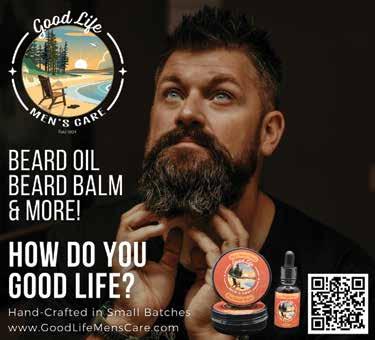


By Bethany Riehl
Have you ever thought about the fact that we have to make the coffee before we can drink the coffee; but we need to drink the coffee to have enough brain juice to make the coffee?
And yet, if my social media feeds can act as research, we all do this: we find a way to make the coffee. To drink the coffee. Some of us don’t mind making it the night before, thus having it ready to go when we wake up. Of course, the real coffee snob connoisseurs believe that this ruins the integrity of the coffee beans. But we’re not here to talk about that.
What does coffee have to do with Christian Living anyway? Nothing. Absolutely nothing.
However, most of the Christian life can be summed up in doing the thing before we feel like doing the thing in order to do the thing.
Or, more simply said, we obey first and feel like it later.
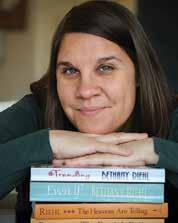
Sure, we might stumble around, stubbing our toes and spilling coffee grounds along the way – to stick with the whole coffee thing –and we will need to clean up our messes, but first we obey. We read His Word, not to feel at peace, but we feel at peace because we read His Word.
We worship, not only when we feel like it; we worship because He is worthy. And the more we worship, the more we desire to worship. We live out the one anothers so that we can love the Body of Christ in action; we don’t wait for the Body to love us. And by obeying and serving the Body we tend to find ourselves loving and wanting to serve the Body, savvy?
But how do we do this? This isn’t mind-blowing information, I realize. After all, most of us have read these admonitions in Scripture. I know the command and I want to obey, but my flesh digs its heels in the dirt and contemptuously pouts, “How? How do I do the thing when I don’t feel like doing the thing?”
We speak to our souls instead of listening to our hearts. Sometimes – so often! – that is akin to dragging a dog on a leash that doesn’t want to leave the park, but we simply trust the process that God has laid out for us and simply obey. Before we want to obey.
Making the coffee so that we can drink the coffee, you see? We do it every day for much smaller pleasures. What greater pleasure than to please our Master?
David shows us this practice over and over in the Psalms but it’s easy to miss if we’re not paying attention. He says in so many words, “Cheer up, Soul! Listen here. God is good. He is gracious. He is kind. Why are you fretting and whining and going about with a long face? Put your hope in Him!”
It might be true that your world is falling apart – look to the One that holds all things in His hands.
It might be true that you’ve lost your zeal and have no idea when you’ll get it back – look to the One that was filled with zeal for the Father on your behalf.
It might be true that you’re being treated unfairly – look to your Defender.
In this day and age, it is difficult to avoid messages about taking care of ourselves first, cutting people out that don’t “serve” us, or that God came to make our brokenness beau tiful, and that we should press into it. That as
long as we keep bad thoughts to ourselves, we’re fine.
Or the worst lie: that as long as we’ve believed in Jesus for our salvation, we’re free to behave however we want.
Oh, Christian. Do you not know that He died not only to forgive our sins but to free us from our futile way of living (1 Peter 1:18)? We’re not done. Saved, yes; and saved by grace alone. We cannot work ourselves into salvation, we cannot earn it. Jesus’ blood alone can atone for our sin. But, He didn’t save us just to give us a pass to eternal life. He saved us to make us holy (Colossians 3). He wants us to be like Him for our good and His glory.
It’s easy to gloss over the process of becoming like Jesus. When we were saved, we were (past tense) justified (declared forgiven); now we’re being (present tense) sanctified (made more like Jesus as we work with the Spirit to obey Him in all things); and one incredible day, we will go to be with Him and will be (future tense) glorified forever.
Ever heard the saying, “God doesn’t want us to be happy, He wants us to be holy”? At first blush, it’s true. But look closer. That seems to imply that we can’t be both at the same time.
What greater happiness can the Christian have but to be holy like our Lord? As if sin is something we’re missing out on.
Let me ask you, when has sin ever served you?
And going back to feeling like obeying, when have you ever willed your feelings to do your bidding?
We trust the Lord and His process because He is trustworthy. We obey before we want to because He’s already fulfilled perfection for us. We do our very best, knowing that it won’t be enough, but thanking Him for coming alongside us.

We don’t coast the rest of our lives, waiting for our feelings or inspiration to match what we must do in action. I’m still drawing on my running experience this summer, so I must add that I often didn’t feel like running, but to get to the finish line of four half marathons, I had to spend my summer running anyway. How? I put on my shoes, went outside, and ran, whether I felt like it or not.
How can we pursue holiness when we don’t feel like it?
“Therefore, since we are surrounded by so great a cloud of witnesses, let us also lay aside every weight, and sin which clings so closely, and let us run with endurance the race that is set before us, looking to Jesus, the founder and perfector of our faith, who for the joy that was set before Him endured the cross, despising the shame, and is seated at the right hand of the throne of God” (Hebrews 12:1-2, bold
By the grace and power and mercy of God, we
Bethany Riehl lives in the Treasure Valley with her husband, three kids, and one super chill dog. She writes articles and fictional novels when she can, and her one desire is to point others to the love and sufficiency of Jesus Christ.
The following information is provided by Wednesday’s Child, an organization that helps Idaho foster children find permanent homes.
Eddie, 17, is a kind, respectful and well-mannered teen who speaks Spanish and is working hard on mastering English. He enjoys reading, playing video games, and watching documentaries. Eddie loves to be outdoors and stay active and is looking forward to playing football, baseball and pickleball on a school or community team once he gets settled into his permanent home.
When asked what qualities he possesses that could make him a great fit for a family, he said that some things that would be important for prospective families to know about him are that he tries to avoid problems and to be accommodating; that being clean and maintaining a clean personal space is really important to him; and that he loves to joke around but prides himself on making sure that it’s all in good fun and that he doesn’t hurt other people’s feelings. This thoughtful young man defines a good life as not necessarily having a lot of material things, but having enough to get his basic needs met and then concentrating on creating a life filled with balance, peace, and tranquility.
Eddie loves Panda Express, Chinese food, and food from Guatemala. He likes to do some cooking on his own when he has the chance and is good at making tortillas, sopas, eggs, beans and rice. Eddie enjoys learning new things and has an interest in science, mechanics, and the field of construction. He works hard in school and strives to be an active participant in all aspects of his life. Eddie considers himself a Christian and would like a family who supports his religious beliefs.
Eddie is in need of a guardianship placement. If you think that Eddie could make a wonderful addition to your family, inquire today at www.idahowednesdayschild.org. n
For more information on the Idaho Wednesday’s Child Program, visit www.idahowednesdayschild.org, or contact Specialized Recruitment Services Administrator Shawn White at swhite52@ewu.edu or cell (208) 488-8989.
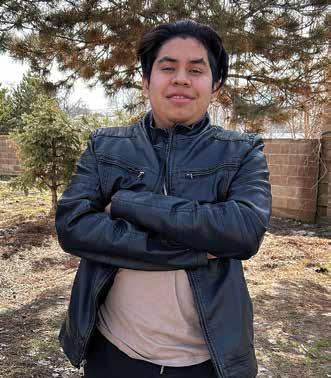


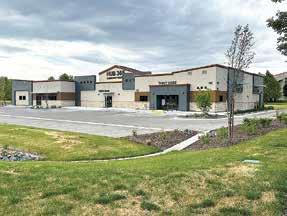
HUB 365 is an all volunteer ser vice organization. Procee ds from our sales will fund various programs for the community.
pantr y is open to ever yone. Our Thrift Store & Clothing Boutique provides low cost items to people in need. All inventor y is donation based. Ser ving those who are food insecure through donations and the support of the Idaho Food Bank.
3PM for an appointment please visit redcrossblood.org
8/25: Health Fair 10AM to 4PM
9/8 & 22: Plant Based Paradise - A Guide to Healthy Cooking & Eating 1PM to 3PM

Come shop Tues.- Thurs. 10AM to 4PM Donations Accepted Tues-Thurs. from 10AM to 4PM (Donation drop-off behind the store) First 4 Saturdays of each month from 2PM to 4PM

By Dennis Lopez
At first glance, the hyper-competitive world of auto racing and faith-based religion may seem polar opposites. The reality is that for many involved in the sport, there is a rich vein of commitment to faith in God.
Just where the source of that vein began seems unclear, but most likely starting with individual members of the racing community who carried Christianity as part of their lives both on and off the track. Today, both NTT IndyCar and NASCAR have full-time

ministries that travel with their respective racing series. Each is dedicated to spiritually helping those in the sport deal with the incredible pressure of intense competition.
For a Payette, Idaho native and NTT IndyCar driver, his faith and his profession have melded into one. His name is Sting Ray Robb, and at 22-years-old, his racing career is propelling him forward towards becoming an IndyCar champion.
He will do so this season sponsored by Pray.com, a Christian social networking service and mobile app that serves as a social media platform for religious communities.
“With the explosive growth of Christian advertisers being embraced by television networks like CBS, FOX, and others, we recognized motorsports fans as an incredible audience for Pray.com,” said Steve Gatena, Founder and CEO of Pray.com.
“We partnered up with Sting Ray – not only because of his cool name, but also because of his Christian testimony.
“The more the Pray.com team got to know him, the more we came to love him – he’s got an infectious faith and a great passion for sharing the power of prayer.”
And yes, his backstory is nearly as unusual as his “cool name,” which is a combined derivation of Stirlingshire, Scotland, shortened to Sting, the place where his ancestors lived, and his grandfather’s first name, Ray. And racing was seemingly always on his mind.
“When I was four-years-old, I watched a YouTube video of Travis Pastrana jumping a go kart into a pit of foam rubber,” he said. “When I saw that, I was hooked. I wanted a go kart.”
That go kart came a bit later but too soon to start Sting Ray on the road to becoming a future racer. He was too young to compete. Instead his race track was the family’s long driveway where he drove daily for almost a year.
“It was almost impossible to get him off the kart,” his mother and “momager,” Kimmie Serrano, recalls. “He knew he wanted to race.”
Robb began racing competitively at five-years-old, about the time most kids are trying their hand at T-Ball or soccer. After gaining experience racing at local kart tracks, an eight-year-old Sting Ray Robb entered the wider world of motorsports, racing at tracks and events nationally in the Cadet Class.
By 2014, he moved up to racing in the Junior Division where in his first season he finished second in the United States and then raced











internationally in Spain and Portugal. The following year, he won the U.S. National Rotax Junior Division championship.
He moved up to racing cars in 2016, racing in the NASCAR-sanctioned K&N series, and ultimately into open-wheel cars beginning with the late Pro Mazda Championship series. By 2020, he won the series championship. That championship opened the door to the Indy Lights program, one rung away from what is arguably the top of the American racing ladder, racing in the NTT IndyCar series, including the “Great American Race,” the Indianapolis 500.
Robb’s first Indy car ride came in 2023, driving for the auto racing dynasty, Andretti Autosport. For the 2024 season, Robb drove the Number 41 car for A.J. Foyt, himself a four-time winner of the Indianapolis 500.
There is no question that Robb’s racing resume’ is impressive. But it is Sting Ray Robb the young man that is most impressive. He is an admirable young man driven by his desire to reach the top of his profession, yet remains firmly grounded to his Idaho roots, his family and his faith. It is perhaps the mechanism that gives him balance between the two worlds.
Racing has many component parts but ultimately it comes down to two elements: mechanical and mental. Poor performance can come from one or both. The mechanical side, the race car and its myriad systems, pieces and parts, can lead to failure. But generally mechanical issues can be found and fixed.
The mental component is another story. A growing number of professional athletes are turning to mental coaches to help them in their careers. Mental coaches are becoming as important as physical trainers.



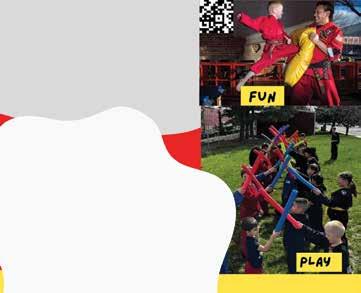
Robb, on the other hand, relies on his spiritual connection and faith as a way to navigate the difficulties of auto racing. In a previous interview with writer Marshall Pruett, he recounted how his faith and belief system helped him overcome his disappointment in his on-track performance.
“I was really frustrated…and I took my helmet off, went stomping in the trailer, and I just went on a little walk by myself for a while,” he said. “They’ve got those trees out in the park area there in MidOhio, and I just knelt down and started praying. I was like, ‘God, this is it. I feel like I’ve given everything that I can, and if it’s not the car breaking down, or someone running me off the track, then it’s me. Everything that can go wrong, has gone wrong. I’m done, this is all I can give anymore.’
“I all of a sudden had this peace about me: this is all part of the plan,” he continued. “This is preparing you, this is what’s going to make you great in the future, because it’s teaching you to persevere. That was that same weekend that I won my first race, and from there on, it was like the floodgates broke open.
“I think that the trials and tribulations, and everything that has gone wrong, has taught me so much about becoming a mature driver: Not only how to handle a bad situation, but how to succeed in a bad situation, and having the confidence to look at it and go, ‘OK, I know what I’m capable of, I believe in the team that I’m with, and I know that whatever they throw at us, we’ll be able to fight through it,’ which I thought was pretty cool.”
Sting Ray Robb is an impressive young man, not only because of his successes on the race track, but also because of his sincere faith in God. n






By Bradley Shotts
“He heals the brokenhearted and binds up their wounds.” – Psalm 147:3
Sometimes in life the wheels of the bus that go round and round come flying off. We have all been there.
I think about different families that I have served over the past 30 years. So many stories and images in my mind that will forever be there. More times than I can count, I remember looking across the table at families who are facing such tremendous loss, thinking, “How in the world are you coping with this tragedy?”
Then I am reminded… It is only by God’s love, tender mercy and grace.
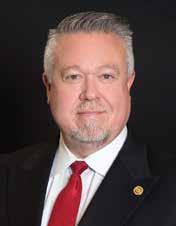
Funeral directors and first responders all have that one call that they never forget. I have so many families that I will always remember and hold close to my heart, but there was one call in the spring of 2000 that I will never forget. We were called to respond to a car accident. Upon arrival, the urgency of the call quickly escalated when the victim in the car was identified. Law enforcement on the scene turned to us and said, “This is my lieutenant’s 16-year-old daughter!” The officers then turned to see that the lieutenant, completely unaware, was pulling up to the scene about 50 yards away. Five officers quickly made their way to his vehicle. I do not know what they said to him, but in less than 30 seconds they had him in a vehicle and he was being driven away. At that moment, we all just stood there out of respect to him, pausing. None of us were verbal, but I know everyone of us were saying prayers for this father.
I knew that I would be the [funeral] director to meet with him. I also knew what his first statement to me was going to be. He came in that afternoon to meet with me and I was not wrong in predicting what he was going to say. The first thing he said was, “I want to see my daughter.” I had already prayed for God to give me the right

words to say in preparation. As long as I live, I will never be able to not see the look in his eyes and the look on his face as I gently explained that seeing his daughter was not something he needed to do. This father, who towered over my six-foot one-inch frame, began to cry uncontrollably. At that moment, I no longer cared about holding it together and joined him in his grief. There are no words for moments like this; you just remain silent and pray for God to bring comfort like only He can.
Over the next several days there were many moments of pause, grief and prayers as I helped this mom and dad do the one thing that they never thought that they would ever have to do.
The night we held her visitation at the funeral home, the last person walked by her closed casket to pay their respects around 10:45 p.m. You can imagine the love and support that came from her high school and all departments of law enforcement throughout the state.
Everyone had left the building and I was locking up. As I stood outside and was turning the key to lock the door, I felt the hairs on the back of my neck stand straight up. I could feel that someone was standing somewhere behind me. I slowly turned around. There were only two cars remaining parked close to the building. Mine and the lieutenant’s. My eyes moved away from the vehicles and there he was, his tall framewe shadowed in the darkness. He began to walk closer to me and I noticed that he was carrying something in his arms.
He made his way over to me, now standing in the light where I could see. I looked up at him and he had tears running down his cheeks. He held a blanket in his arms and my eyes immediately began to tear up as well. He looked at me and said, “Even though my daughter was 16 years old, I still tucked her in bed every night. Since I cannot do that tonight, I was wondering if you would do this for me?” Somehow, I found a voice to assure him that I would be honored to do so. He thanked me and turned and walked to his vehicle. I then returned inside the funeral home to do what I had promised.
I know from studying God’s Word that when we hurt and grieve, God hurts and grieves. Sometimes the pain is so great it is only God that can bring comfort. In Philippians 4:7 it talks about His peace that surpasses all understanding, that guards the hearts and minds of those who trust in Him and pray to Him. We also find in Psalm 34:18, “The Lord is close to the brokenhearted and saves those who are crushed in spirit.”
May you find peace and rest in your heart and mind, knowing that as you trust in God, no matter what you are facing, He is faithful and just and He will see you through to the other side.
“Now to him who is able to do exceedingly abundantly above all that we ask or think, according to the power that works in us, unto him be glory in the church by Christ Jesus throughout all ages, a world without end. Amen.” – Ephesians 3:20-21 n
Bradley Shotts began his ministry in the funeral industry in 1988 at Lloyd James Funeral Home in Tyler, Texas. He currently serves as a director at Slay Memorial Funeral Center, Aubrey, Texas. He and his wife, Amy, live in Bedford. They have two adult children, Blaine and Braylee, and one grandson, Matthew Bradley. Shotts is a member of Rotary International and enjoys serving in his community. As God directs, he enjoys singing and speaking. He is an ordained minister and loves being used of God
By Greg Grotewold
Have you ever walked into the sanctuary on a Sunday morning feeling like a fraud, a fake? I have. If the congregation only knew the fight I just had with my wife on the drive to church; if they only knew how many times I became impatient with my children the past week; if they only knew the doubt I carried into the service regarding Christ’s love for me. If they only knew.
The good news is that shouldering such shame has become a thing of the past. It’s not because I’ve eradicated sin in my life, however; it’s because I’ve learned over the years that there is a central difference between feeling like a fraud and being one. Sinning doesn’t make me or anyone else a fake. It makes us human, broken people living in a broken world and in desperate need of God’s restorative grace. Believing (and acting like) one isn’t broken is what makes someone a fraud, for he or she is living a lie and walking in darkness.
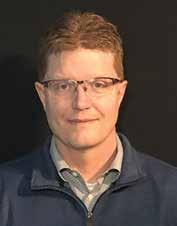
“This is the message we have heard from Him and proclaim to you, that God is light, and in Him is no darkness at all. If we say we have fellowship with Him while we walk in darkness, we lie and do not practice the truth. But if we walk in the light, as He is in the light, we have fellowship with one another, and the blood of Jesus His Son cleanses us from all sin. If we say we have no sin, we deceive ourselves, and the truth is not in us. If we confess our sins, He is faithful and just to forgive us our sins and to cleanse us from all unrighteousness. If we say we have not sinned, we make Him a liar, and His word is not in us” (1 John 1:5-10, ESV).
The concept of sinlessness, euphemistically known as self-reliance by most, is a worldview that allures a wide spectrum of individuals. On one end there are the antagonists, those who are openly hostile to Jesus and everything He represents. Religion – and the sin that drives its need – is a complete fabrication and nothing more than a crutch for the weak.
And on the other end of this spectrum are the relativists. They profess Christ, typically attend church, and generally look the part. However, while such individuals might acknowledge with their mouth that Jesus is Lord and Savior, they don’t actually believe it. He is a marvelous role model from which to tailor one’s behavior, but nothing more. Their logic, however ill-considered, does make some sense given they see humanity as not only basically good but adequately motived and equipped to do good. As long as the good outweighs the bad and one’s transgressions are relatively minor when viewed within the larger scope of human existence, all is well. There is no reason to be provocative and talk about sin, for eternity is a balance sheet – the good deeds will at the end of the day neutralize any stumbles.
While in some respects the two groups share little in common, on a larger theological scale they are close cousins given their shared view of Jesus’s irrelevancy. The antagonists don’t need a Savior because there is nothing from which to be saved. Hell doesn’t exist. The relativists don’t need a Savior because they are their own (a fact they would probably deny). And both groups in their own unique way make Jesus a liar. He isn’t the Lamb of God who came to save sinners as the Bible makes clear, but at best a moral teacher. Calvary is nothing more than a worn-out fable or an exercise in futility. In some ways, I carry more respect for the antagonists than I do the relativists. While they both reject the true Christ, at least the former admit it. The antagonists carry a certain candidness and intellectual honesty. What they do is consistent with what they say and believe. This isn’t necessarily the case with the relativists. Many operate under a degree of subtlety and opaqueness. Whether this makes them frauds is open for debate. Clearly, some don’t know any better, for they have never been taught. Others have and still choose
to hide behind their façade Sunday after Sunday. Regardless, there are no excuses, for Scripture makes clear that no one is without sin, and therefore everyone falls short of God’s standard. “For all have sinned and fall short of the glory of God” (Romans 3:23, ESV). It takes only a single transgression, irrespective of impact, to become guilty.
“For whoever keeps the whole law but fails in one point has become accountable for all of it” (James 2:10, ESV). Guilt is a death sentence. There is nothing relative, conditional, or proportionate about it. The wrath that such culpability produces cannot be mitigated, reasoned away, or forever ignored. It’s an absolute reality regardless of any attempt to assuage it.
If you fall somewhere on the self-reliant spectrum, 1 John 1:5-10 is a gracious warning to take heed. You are carrying a false sense of security, and the Lord wants to arrest your soul with the truth. Sin comes with a cost, and you must understand that there is no soulsaving mercy for those who think they don’t need it. Someone must pay for your transgressions. A just God demands it. Who will that be? There are only two options: Jesus, if you humble yourself before Him; or you, if you don’t.
I plead with you to step out of the darkness and into the light. Take your brokenness and surrender it to Jesus. If you do, He is faithful and just to cleanse you from all unrighteousness. In fact, He will not only redeem your soul but rejoice over it. “The Lord your God is in your midst, a mighty one who will save; he will rejoice over you with gladness; he will quiet you by his love; he will exult over you with loud singing” (Zephaniah 3:17, ESV). It’s a splendid picture, the Lord of the universe jubilantly singing over one of His redeemed children. May His next song be yours. n
Greg Grotewold lives in Oakdale, Minn. with his wife, Sandi, and their two sons, Luke and Eli. He is a deacon in his local church and greatly enjoys serving in this capacity.






By Larry Banta
During the month of February, I was able to travel with my wife and daughter to some remote areas in Kenya and India where we were able to provide encouragement through several projects related to building strong families. Our main theme was “Be Strong and Courageous” based on the book of Joshua. Joshua and Caleb are a couple of my favorite guys in the Old Testament. They had a big job: a physical battle to take over what would become the land of Israel. It was a difficult job, but if they would commit to God, follow His commands, be obedient and faithful, they would win every battle and the land would be theirs.
In the remote villages we visited, there has been over the years a good bit of persecution. In Kenya a nearby tribe has been terrorizing the area, making it difficult for people to want to leave their homes to get to church. In parts of India many groups are out to destroy the Church and bring people back to their pagan beliefs. Both areas had seen a good bit of violence over the years. There was a true need to be strong and courageous. We may not be facing the problems of these people yet, but we do live in this world and have our share of heartache and difficulty. How can we be strong and courageous and get through our challenges?
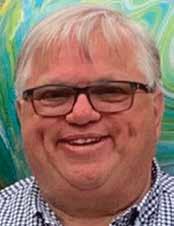
precious stones to represent who they were before God and man. Our righteousness comes from the blood of Christ, and thus serves to protect our allegiance to Him. The breastplate covers our heart, our seat of emotions. We then have our shoes which propel us forward with the gospel while protected by the shield of faith which extinguishes the arrows propelled at us by the enemy. Protecting our head, our brain, is the helmet of salvation, that assurance that we are His children and He will guide, protect, defend, and empower us to be triumphant in our battles. We also have a sword, the powerful neverchanging Word of God.
What are the arrows? Maybe temptations, hatred, division, envy, deceit, lies, gossip, inappropriate thoughts, anything designed to draw us away from God.
The first thing that Joshua did before they ever started into battle was to draw the people back to God. The Passover was ignored for 40 years in the desert wanderings. Circumcision was also not done. God had commanded these observances as a way to show faith and obedience to Him. Joshua started with getting back to those basics. Our preparation for battle is not quite the same, but we do need to draw near to God. We need to practice intimacy or closeness with Him. When we draw away from God, ignore Him, stop communicating, we lose our strength, our resilience, and our ability to be courageous. Alone I am not a very courageous person, but with God’s strength I can face and have faced many difficult challenges.
James 4:8: Draw near to God, and he will draw near to you. Cleanse your hands, you sinners, and purify your hearts, you double-minded.
Revisiting Kenya where I once lived for two years a long time ago always brings to mind the mighty lion. He wanders about sneaking through the tall grass and looks for easy prey, one who has wandered from the herd. Then he attacks. In I Peter, Satan is described as a lion seeking whom he may devour.
1 Peter 5:8: Be sober-minded; be watchful. Your adversary the devil prowls around like a roaring lion, seeking someone to devour.
He has a plan for you. He wants to sew DOUBT in your mind, begin to DISTRACT you and then DIVERT you so that he can DEPLOY you and once he has used you sufficiently for his purpose, he DESTROYS you.
So, to be strong and courageous in the battles that are always facing us we need to get suited up in some protective gear.
Ephesians 6: 13-18: Therefore take up the whole armor of God, that you may be able to withstand in the evil day, and having done all, to stand firm. Stand therefore, having fastened on the belt of truth, and having put on the breastplate of righteousness, and, as shoes for your feet, having put on the readiness given by the gospel of peace. In all circumstances take up the shield of faith, with which you can extinguish all the flaming darts of the evil one; and take the helmet of salvation, and the sword of the Spirit, which is the word of God, praying at all times in the Spirit, with all prayer and supplication.
We have the belt that is the binding truth of the Word of God. We put on a breastplate of righteousness to protect our heart and emotions. The priests of old wore a breastplate specially designed with
Joshua’s top commander was Caleb. He was a man of great faith and determination. He fought valiantly and helped to conquer much of the promised territory. His promise from Moses was that once subduing the enemy he would be offered whatever territory he wanted for his own. He chose the land near Gaza where the Anakim resided. These were giants – many were over 9 feet tall! He told Joshua, though 85 years of age, that he was quite capable of going into battle to defeat this enemy. Not on his own strength, but he was going with God, allowing God to use him to defeat the enemy.
What giants are you are facing today? Life has its struggles on its own, but the enemy adds to that, making it much worse. If we try to go to battle on our own, we will be defeated. To face the giants we need a plan, a strategy.
Athletes have to be in top shape to be able to fulfill the roles they have. They need to be in great mental shape as well. They need to know their role, practice the skills and be ready for the competition. Soldiers are also called on to be in good shape, but they also learn about the enemy and devise strategies to defeat him and come out victorious.
2 Corinthians 10:3-6: For though we walk in the flesh, we are not waging war according to the flesh. For the weapons of our warfare are not of the flesh but have divine power to destroy strongholds. We destroy arguments and every lofty opinion raised against the knowledge of God, and take every thought captive to obey Christ, being ready to punish every disobedience, when your obedience is complete.
To be ready to face our enemy and our struggles, we must be in spiritual shape. We need to exercise – that is, to have spiritual discipline. Our enemy loves passivity, just letting things go by, not dealing with the challenges. Our God says we are in a battle and need to be ready.
Joshua took his army back to the basics of faith and obedience, to get them ready to battle. We need the same. We have to get back to the basics, the foundation that is firm and will not change: the Word of God. We need to be communicating regularly with God in worship, Bible study, prayer, small group and church attendance. Daily connection with God is essential. Then we can be strong and courageous to face our giants! n
Dr. Larry Banta is an author of several books, a retired psychiatrist, and a former missionary. He served in India, Mexico and Kenya. He and his wife, Evelyn, a counselor, travel together to provide consultation and training in various international locations.
By Vincent Kituku
In the fall of 1986, God blessed me with a situation that should have been a depressing experience. I found a human hair in my food. That was a blessing in disguise. I had been in the U.S. for less than a year when I asked a friend of mine to take me to Denver, Colo. to look for a car for my family. We shopped way past lunchtime, and about 3 p.m., we decided to take a break to find a restaurant. My friend took me to a place where chicken meals were sold. The good smell and the appetizing look of the food were beyond my imagination.
Chicken in Kenya, where I grew up, was very expensive and many people could hardly afford it. Then, here I was at a well-known fried chicken restaurant. I enjoyed every bite with an intensity words cannot describe. But before I cleared my plate, I noticed a white person’s hair. I just wanted to put the hair aside and continue with my lunch. However, my friend saw it and immediately asked for the manager and showed him the hair in my almost finished food. The manager was so apologetic, but I couldn’t understand what was the big deal. Then the manager said the most heartwarming words of the day, “I will give you another plate of food. We are sorry for the hair.” I was not sorry for the hair. I thanked God for it. Now I wonder how many other times I visited a chicken restaurant and looked for another hair just to be blessed with an extra plate of chicken.
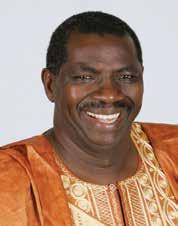
On reflection, I have thought of the many situations where we focus on trivial inconveniences and overlook the blessings that might be disguised. We complain about a rainy day at the expense of thanking God for the food that will be harvested, as a result of the rain, for our survival. We complain about our jobs instead of thanking God for our employment. We complain about what we don’t have instead of thanking God for what we do have. Having an attitude of gratitude is a choice we make as individuals. You can choose to see the “social hairs” in your life or the extra plates of blessings you get because of the hairs. You do better when you choose to bless the Lord and forget not the second helping that you may get at no extra charge. Think of the clean water or the fact you may not have to worry about your next meal or your family or your health. And don’t forget that if you are reading this article, you have been blessed with another day that many people didn’t live to see. n
Dr. Vincent Muli Wa Kituku, motivational speaker and author of “Overcoming Buffaloes at Work & in Life,” is the founder and executive director of Caring Hearts and Hands of Hope, a nonprofit organization that raises tuition and fees for poor orphans and other children from poverty-stricken families in Kenya. Contact him at vincent@kituku.com or (208) 376-8724.





















